|
FAQs about the Yellow-Tail Blue, Palette,
Hippo Tang Disease Diagnosis
FAQs on Paracanthurus Tang Disease:
PYTB Tang Disease 1,
Pacific YTB Tang Disease 2,
PYTB Tang Disease 3,
Pacific YTB Disease 4,
YTBT Health 5,
YTBT Health 6,
YTBT Disease 7,
YTBT Disease 8,
YTBT Disease 9, YTBT Disease ,
& Tangs/Rabbitfishes &Crypt,
FAQs on Paracanthurus Tang Disease by Category:
Environmental,
Nutritional, Social,
Trauma, Pathogenic (plus
see
Tangs/Rabbitfishes &
Crypt), Genetic,
Treatments
Related Articles: The
Genus Paracanthurus,
Related FAQs: Pacific YTB Tang FAQs
1, Pacific YTB Tang FAQs
2, Pacific YTB Tang FAQs 3,
Pacific YTB Disease 4, Pacific YTB Tang FAQs 4, YTBT Health 5, YTBT
Health 6, PYTB Tang ID,
PYTB Tang Behavior, PYTB Tang Compatibility, PYTB Tang Selection, PYTB Tang Systems, PYTB Tang Feeding, PYTB Tang Reproduction, Surgeons In General, Tang
ID, Selection,
Tang
Behavior, Compatibility, Systems, Feeding, Disease,
|
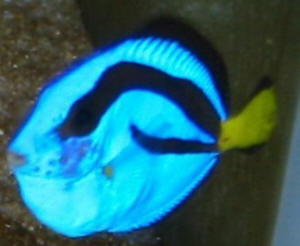
|
Surgeonfishes: Tangs for Marine Aquariums
Diversity, Selection & Care
New eBook on Amazon: Available
here
New Print Book on Create Space: Available
here
by Robert (Bob) Fenner |
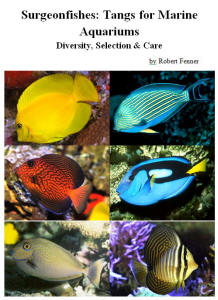 |
|
Blue tang illness 12/9/17
Hello Bob and crew !
It has been a long time since my last contact.
Lately I lost view of my blue tang and today I saw him in a bad condition.
<Eeyikes Thanasis! This poor fish is about eaten away... HLLE is the general
term...>
He has lost his blue color and he looks seek. He has not eaten for two weeks at
least. I took a photo of him and I am sending it to you in case you can advise
me what is wrong and if I can help him.
Best regards from Greece, Thanasis
<Perhaps vitamin, appetite stimulant added to the water directly, favorite foods
soaked in it. Please read here:
http://www.wetwebmedia.com/HLLESWCauseF.htm
and the linked files above, and:
http://www.wetwebmedia.com/paracfdgfaqs.htm
And write me/us back with your further observations. Bob Fenner>
|
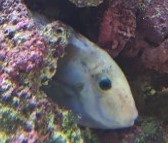 |
|
Crypt, velvet or infection? ID help, please...
12/10/15
<Six plus megs of uncropped pix? Why?>
Greetings! I'm unfortunately without microscope and would appreciate some input
on the current malady I see in my tank if you would be so kind.
<How could I, or anyone tell from these images?>
300g tank.
About 30 SPS frags.
Hippo tang.
Three yellow tangs.
Pajama cardinal.
Six line wrasse.
Eight blue green reef Chromis.
Peppermint shrimp.
Skunk cleaner shrimp.
Tank is a year old. It was moved a year ago from being set up for 12 years
and all livestock was given away. It has all the same live rock as before.
Fish have all been in tank for four months. Corals for about 5 months, with one
being introduced 2 months ago.
Three days ago I did a flatworm exit treatment since I was
finally sick of siphoning out hundreds of flatworms with each weekly water
change. All seemed to go well, and I did a 25% water change at the end, as well
as running activated carbon in a reactor for a day and siphoning as many dead
worms as I could.
Around that time I noticed a little white area on the hippo tang's forehead.
Since then it has grown to a full white forehead and a white spot on either
side. I have attached a picture.
<.... looks like a scratch on the flank.... Physical trauma>
I don't know if I am seeing things or the yellow tangs seem like they may have a
white sheen over their whole bodies, but it is only visible when looking at the
fish from the front. From side view they look normal.
The cardinal seems fine. Six line wrasse seems fine. Chromis' seem fine,
although one of them seems to have a physical injury and a little brown spot in
the side.
None of the fish have been scratching. None are breathing rapidly. All have
voracious appetites, with the hippo tang being the most voracious. No hiding.
All swimming out in the open. Gills are not swollen.
Could you please check the picture and my descriptions and tell me if you think
it is crypt or velvet, or possibly some sort of infection brought on by lowered
immune systems due to toxins from the flatworm treatment?
<Can't tell anything from the pix, description>
I would think if it was velvet everything would be dead already, and I am ready
to try and catch all fish and place in a hospital tank and treat if it is
necessary.
<... no need to move, yes to Velvet>
Please let me know if the picture doesn't come through. I appreciate all that
you do! You guys helped immensely many years ago and all has been smooth sailing
in my tank until this incident.
Thank you! I look forward to your reply.
Thomas Bolton
<Don't panic! Bob Fenner>
|
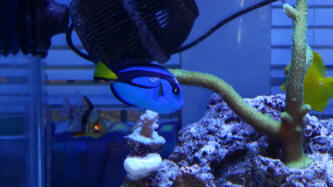
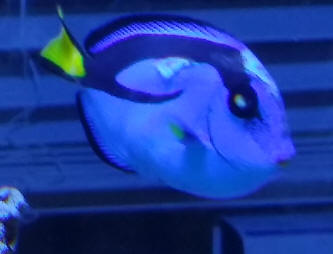 crop
crop |
Blue regal tang; sans info.
9/8/15
I have had my blue tang for more than two years has been doing great now all of a sudden it's hiding not swimming not eating does not have ick what
could be wrong
<Need data.... see WWM re Paracanthurus re the kinds of info. we're looking
for. Bob Fenner>
Blue tang swimming vertically
5/12/15
Hi need help my blue tang is suffering from swimming problem all water
parameters are stable i currently have 1fox face 1 bubble tip anemone 1 blue
ring angle 1dr wrasse 1 blenny all are doing well currently the blue tang is in
a hospital tank
<Mmm; well... there are a few possibilities here; but am leaning toward the
Paracanthurus being stung/stuck by the Siganid or BTA.... See WWM re both.
Not much to do other than be patient, separate the PBT. Bob Fenner>
|
Help to identify and treat disease
12/4/14
Hi,
I was wondering if you know what this disease is, nobody seems to want
to guess
http://www.reefcentral.com/forums/showthread.php?t=2460931
|
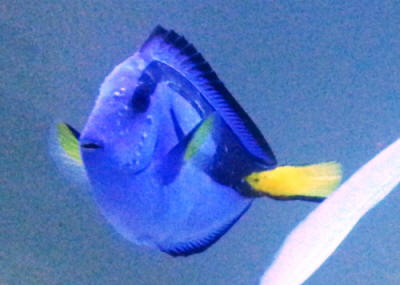 |
|
<On the Paracanthurus here I take it... Have you sampled
any of these... looked under a 'scope? Either something surface like
monogenetic Trematodes (flukes), or Microsporidean>
I took these pictures today a week later, his forehead is now expanding, I
have done extensive freshwater dips and am dosing Cupramine but no reaction
so far.
<Not treatable w/ copper>
http://www.myalbum.co.uk/Album=AXDYWLH4
|
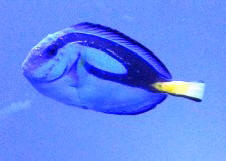 |
|
I'd really like some help with this and don't know what
it is,
Thanks in advance,
Ed
<See WWM re the above... the former are easily treated w/ prophylactic
dips/baths and Anthelminthics, the latter... not treatable as yet as far as
I'm aware. Only improving the environment, nutrition... optimizing and
stabilizing the fishs health will it be able to improve if Microsproridean
(internal) involvement. Bob Fenner>
Re: Help to identify and treat disease
12/4/14
Thank you for the quick reply, the bulging band across the forehead has
receded somewhat as four white parasites now hang out of it whereas it was a
smooth bulge before. I will have a go at the dips with some trematode
medication and ease off with the Cupramine.
<Good; I'd give up on the copper... see WWM re this and Tangs; a poor match>
I see hypo is ineffective for flukes too and the main tank has been in hypo
for many weeks so by process of elimination it may well be flukes. Thanks
again,
Ed
<Easily identified w/ sampling, microscopic exam... and just as easily
eliminated. READ on WWM re.
BobF>
Re: Help to identify and treat disease
12/7/14
Hi Guys unfortunately not looking good at present. Video update here
http://youtu.be/a4WdG0B_cCc
<Mmm; Paracanthurus looks like it's developing HLLE, the Y. Tang breathing
hard... rest of fish look fine; but a Clown Trigger (dangerous; will kill
other fishes in time), and a hamlet/sweetlips?! Not easily kept>
Have dosed with
http://www.aquarium-munster.com/en/marine-water/remedies/gyromarin.html
<I see; a product of Praziquantel>
3 days ago as recommended in case is Trematodes but now yellow tang looks
like is bleeding from lateral line and heavily infected with growths causing
craters too.
<Yes>
Blue tang continues to be disfigured as the 'parasite' erodes deeper,
especially in the face, and dotted sweetlips also affected
with holes appearing in his head over the top and underneath gills. The
purple lips Flagfin has a single dot on the forehead that has been there
about a week but the join of his pelvic fins is blood red. Bannerfish eats a
few bits off the yellow tang on cleaning service and clown trigger seems
largely unaffected. The setup is about 2 years old but never had such a
difficult issue. It is about 3.5 weeks into the infection. Is fish only
setup with uv, protein skimmer (both off for 3 days on meds) and sump filter
tank below so any meds can go in the display tank. Anything else I might
try? I don't have a scope unfortunately. Thanks Ed
<The scope; as originally stressed. There's very little sense in
"treating" for something you don't know. Perhaps a download and
reading of the second ed. of Ed Noga's "Fish Disease; Diagnosis &
Treatment"... you can get from Amazon.com for a nominal charge for the
e-version. Call around; some fish stores, colleges w/ bio. depts. will have
microscopes, folks to help.
Bob Fenner>
Re: Help to identify and treat disease... Flukes
12/7/14
Thanks Bob, I tested all the water parameters and found nitrite had
shot up, no ammonia or nitrate, so did about a 50% water change and redosed lost
Praziquantel. Ca, Mg and pH all on low borders but probably because is slightly
hypo still. I did 5 minute freshwater dips of the Sweetlips, yellow tang, blue
tang and Flagfin with Paraguard. The majority of the infection dropped off the
yellow tang this time,
<Preserve some... just with distilled clear alcohol if nothing else... to look
at under a scope>
he is still breathing hard and his face and body look like they are covered in
acne scars now, lots of sore little red holes remain.
<Likely fluke haptor holes>
Less obvious reaction on the blue tang but perhaps less white and more
grey/black at the infected points. They all seem quite content and swimming
around since. I have upped the water surface agitation to make up for the
skimmer loss and added some Pimafix
<STOP writing me/us... READ on WWM. WORSE THAN WORTHLESS>
at the fish importer's recommendation to help the raw skin heal. I don't know if
it will do any good so long as it does not harm them but they say it works for
them. Mind you they also said vodka or white vinegar solution directly on the
infection works but will leave that as a last resort.
<....no>
Regarding the Sweetlips I have found him one of the hardiest fish I have cared
for since had him the past six months. He fed on pellets ravenously from day
one. I have read a lot of people saying they drop dead quite quickly without
reason but six months in he is growing well and has dodged ich when it affected
other fish. I am just concerned he will need a lot more space. I see the Persian
Gulf is the edge of his natural habitat so in a worst case scenario I'd put him
back to sea - as am based in Dubai.
<Don't do this. NEVER return captive organisms to the wild... too much chance of
introducing other undesirables>
So far I would have recommended him to others as a starter fish were it
not for all the chat about how difficult they are on forums. Seeing as they seem
a rarity in the US perhaps they were just caught with too much cyanide and
didn't last long. The local Filipino fish shop owner always say they are a very
strong fish and easy to feed. Time will tell. Thanks for all your help, really
appreciate it and will get the recommended book, I did a fair bit of reading of
the Merck Veterinary Manuals which was interesting and a good free resource too
http://www.merckmanuals.com/vet/exotic_and_laboratory_animals/fish/parasitic_diseases_of_fish.html
<Ahh; thank you for this>
. Scope might be a tougher purchase in Dubai.
Best Regards,
Ed
<Mail order if nec. B>
|
|
blue regal tang 9/9/14
<..... Haaaaaha.... Chad.... will take till tomorrow to dnld. your 27
meg file here.... Re-size and re-send all. BobF>
I have a blue tang but he has gray running from around his eyes down to
his mouth the pictures isn't showing the gray that much. he has had it
since I got him a year ago. I have him in a 55 gallon quarantine tank
right now but don't know what to treat him with. I feed seaweed, flakes
different brands, pellets, mysis shrimp and brine shrimp. It eats like
crazy.
Re: blue regal tang 9/9/14
maybe this will make it easier for you I uploaded the pics and a video
blue tang gray on face
blue tang gray on face
View on www.youtube.com Preview by Yahoo
http://img.photobucket.com/albums/v499/1970/DSCN1538_zpsc7b450fe.jpg
http://img.photobucket.com/albums/v499/1970/DSCN1537_zps5c049ece.jpg
http://img.photobucket.com/albums/v499/1970/DSCN1539_zps30810695.jpg
http://img.photobucket.com/albums/v499/1970/DSCN1547_zpsc07d8d19.jpg
I have a blue tang but he has gray running from around his eyes down to his
mouth the pictures isn't showing the gray that much. he has had it since I got
him a year ago. I have him in a 55 gallon quarantine tank right now but don't
know what to treat him with. I feed seaweed, flakes different brands, pellets,
mysis shrimp and brine shrimp. It eats like crazy.
< Classical example of the condition labeled HLLE... a combination of
environmental and nutritional deficiencies... You can look this up on WWM; for
all fishes, just Paracanthurus... Bob Fenner>
|
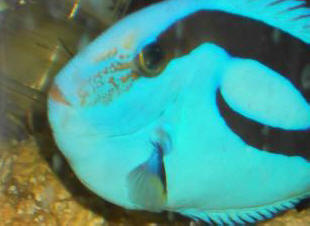 |
Tangs and Skin Troubles
1/26/14
After 17 years in the hobby I am for the first time ever using a
quarantine tank before adding animals to my newest tank build. I have
had a 2.5 inch regal tang
<Wow; small for a Pygoplites... an Indo-Pac. specimen? From... where?
Makes a diff.>
and a 3.5 inch achilles tang in a 65 gallon QT for 2 weeks. The tank was
fully cycled and has plenty of hiding places/toys (all parameters
perfect for QT). They were healthy in all appearance upon arrival, but
after a week the regal began to show white spots ( can't say it was any
Ich I am familiar with but who knows and no pictures as they won't hold
still long enough for cell phone) on and around his head. Also along his
body on both sides appeared to be tiny bumps under the skin.
<Have to sample; look under a 'scope...>
There are minimal attempts at scratching. None of what I'm seeing is
anything I've experienced through these many years. I've never
experienced marine velvet, but there are no rapid breathing symptoms,
evenly speckled dust, or any goldish hue. This didn't help me feel good
about my decision to QT instead if ye ole tried and true natural rock
and cleaners, but now I am in it, I have to move forward along
this path. I decided to use Cupramine (in spite of the fact that I had
an achilles in there that appeared perfect) to see if whatever "it" was
would shed in a couple of days. The skin bumps disappeared, but whitish
"stuff" looking like tiny pieces of white skin (best description), again
both sides of the fish body.
Yesterday was one week into copper treatment, 4 days at the recommended
dose, both fish were still playing, swimming, and eating normally. The
achilles began to show a little tuft of white on his forehead. Today the
achilles has the tiny bumps under his skin on both sides of his body.
So... I'm going to venture a guess here and say that within the next
couple of days the bumps will disappear and whitish "skin" pieces will
appear on both sides of this fish also. Again there is minimal
scratching. Before the achilles showed signs, I was about to ditch the
copper regime and start an antibiotic. I am wondering if you've heard of
such symptoms and whether you suggest continuing with the Cupramine or
moving on to an antibiotic? Again these fish are enjoying life,
swimming, playing, and eating with minimal scratching.
Thank you so much for your time honored research and assistance, Kim
Monroe
<... I'd be reading re the use of Quinine compounds now-a-years
rather than Copper. Antibiotic/s? For what? Of no use here. Bob Fenner>
|
Re Tang Selection 1/28/11- 1/30/11
<Hi Dave>
So a Hippo arrived yesterday 5-6 inches. After the worrying lying
down phase yesterday he's happily swimming around in the QT
and eating well.
Below a shot of him attacking the Nori.
<Nice specimen.>
I have one question though that I'd love your opinion on: On
just one side of his head he has a couple of areas that are
eroded/pitted which were there on arrival (saw when in the bag).
I worry whether this is a problem such as remnants of a
disease/parasite or something new. I've seen some pics on
line of HLE but it doesn't seem that bad.
<May just be the onset of HLLE but not unusual to see this in
larger Blue Tangs. Bob may comment here as well.>
The supplier I got him from (he came by FedEx) says they have a
tendency to dive into the rocks when they catch them and it's
probably that and they didn't notice it before shipping.
Looking at the pics what do you think?
<Maintain good water quality and suggest adding a vitamin
complex such as Selcon to the food, continue to observe. Too soon
to be overly concerned.
I like the first pic, nice. James (Salty Dog)>
|
|
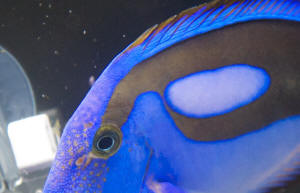
|
Cure for Hippo Tang- white spot and bulging eye
1/17/11
HI Bob/crew
<Srinivas>
Srinivas here form India ( again)
Hope you would help me as usual.
My hippo tang has caught some problems.
1) He has a very tiny white spot (just one) on his body
<Mmm, not a worry... this is likely a "point"
irritation... from maybe getting poked or running/swimming into
something>
2) he has a slight bulging eye c(right one) and a white spot there
too.
<This too is probably due to a physical trauma>
He is in a 200 G FOWLR with
about100 pounds of Live rock and 150 pounds of live sand.
To give him company are
1 Yellow tang
1 Koran angel
1 Oscellous clown
1 Tomato clown
2 green Chromis and
1 Long tentacle anemone
<Could be a tussle w/ the Tang, Angel, the Anemone...>
He is fed with Brine shrimp, Purple Seaweed, ocean free Marine pellets
<Which/what brand? A plug here for you to try/use Spectrum if you
can get hold of it>
and tetra bits.
He eats normally (aggressively) swims elegantly and had shown no signs
of stress.
<Ah, good>
I just noticed the bulging eye just an hour ago (not even an hour). A
recent development I can say.
Please help me to know:
What is this exactly?
What might have caused this?
<See above>
What's the remedy/cure?
<Just good care, feeding, time going by>
Can it be treated in the display tank? ( seems impossible to catch him
in the set up with rocks)
<No need to catch, more, or treat. If you feel compelled to spend
money, buy something useful, look to food supplements like
SeaChem's Reef Plus>
Thanks in anticipation
<Welcome! BobF>
Re: Cure for Hippo Tang- white spot and bulging eye
1/20/11
HI Bob
<S>
Just cant relax with the white spots still on.
The hippo seems to take its time to heal. The swelling in the right eye
has decreased but now I can see two tiny spots on the eye. The right
eye has now caught up and has one big sot right in the middle. The body
has acquired some more white spots.
The yellow tang has shown a bit of stress. On a closer look , I found
two very minute white spots on one of its fin. Rest is all OK
NO abnormalities of any sort noticed.
All fishes are active and feed normally.
Please help.
Is there any medication I can use in the display tank to avoid further
spread?
<... please read on WWM re Cryptocaryon, infested systems...
BobF>
|
blue tang disease 10/26/10
Hello,
<... Hi there>
My Blue Tang has some discolorations on half of his body.
<... these markings and erosive condition are evidence of poor
treatment...
Water quality/environment and nutrition>
Today I noticed the red spot on one side closer to his tail. This
must be some parasite disease and not just his age. What do you
think by looking on his pictures? He is more than 8 years old but
this looks like some disease to me. He has lived in this tank for
a long time and there were no any major changes to the tank
recently.
Thank you for your help,
Tanya
<... Read here: http://wetwebmedia.com/YTBTDisF8.htm
and the linked files above. Bob Fenner>
|
|
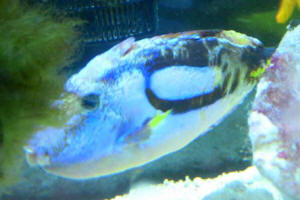 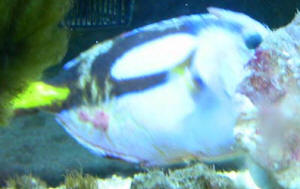
|
blue tang question 9/25/10
At my local fish store, I saw a small (about 3") blue tang. It was
one of the most active ones that I have seen in a long time at the
store. Anyway, it had one issue that concerns me, and I am not sure it
is actually a problem. I have noticed many times in blue tangs that
their stomachs have a lumpy appearance to them. I'm not sure what
that means.
<Most often that they've swallowed a bit of hard substrate...
this is natural, serves as a triturating surface... for
"chewing". Not a worry>
Not sure if that is significant or not. Otherwise, he seemed very
healthy. He was very alert to my presence, very active. Do you think
this fish could be sick?
<Not really>
What does a lumpy stomach mean?
<That this animal has picked up, swallowed some
"gravel".>
Thank you for your help! Mike
<Welcome! I would not have this criterion/observation alone deter me
from purchasing this specimen. Bob Fenner>
HELP (need advice to save) big Sick 6 year old Hippo Tang...
9/15/10
Hi,
<Hello Pam>
Rick & I have a Regal Tang that we have raised from a 3/4 inch
(skinny, ribs showing, full of Ich, sickly) fish to a big 8 inch fat
fish. . .
After returning from the MACNA convention in Orlando, we were told that
he had not been eating from the time that we left for Florida. No new
fish or corals had been added to his tank (with 4 other tank mates) for
over a year. He has had Ich from time to time, but not recently (that
we know of). The clown, Kole tang, purple tang, and copper band
butterfly fish that he shared his tank with are all fine & have
never been ill as far as we know.
<Mmm... summat it ate...>
He cannot swim properly, but when he does, cannot elevate off of the
sand, then flops over with back arched and lays on one side. He lets me
know he is O.K. by moving his pectoral fin that is on the top side when
I approach. When I try to feed him he closes his mouth. Otherwise his
mouth is open when he is lying there.
He has no pectoral <likely you mean lateral> line damage, and his
fins appear to be in perfect shape. To see him, you would not know that
he is extremely ill or hurt except by his "posture" (arched
back & lying on one side). When he manages to swim, he scoots along
the bottom of the sand until he exhausts himself & flops over on
one side or the other. His color, so far, is excellent, but I am
terribly afraid that he is going to die.
None of the other fish that were with him in the tank are or have been
sick. We have not "lost" any fish in quite some time, and I
would love to save our Blue Hippo Tang... We did move him from the tank
with the other fish to a separate 105 gallon tank that had no fish in
it, so that we could see him and hopefully treat him.
I have been dosing garlic and Marine Max, with Omega vitamins, too, for
several days since returning from Florida. But he does not seem to be
improving rapidly, if at all, and he will not ( cannot?) eat.
<Again, my first guess, given the stated history, types of tankmates
and their apparent health is that this fish has ingested something
toxic/damaging...>
Do you have any suggestion and / or advise <advice>? All of the
water parameters are in order.
Pam Erickson
Dynamic Coral, Inc.
<Unfortunately, only patience, time can/will tell here. I would not
expose this fish to any chemical treatments. Bob Fenner>
Re: HELP (need advice to save) big Sick 6 year old Hippo
Tang... 9/16/10
Thank you for your prompt response...
<Welcome Pam!>
By the way, we really enjoyed your speech at the Dallas Ft. Worth
Marine Aquarium Society recently and your appearances and everything
you had to say in Orlando, Florida. Your presence is always fun &
your knowledge of all things aquaria is always appreciated. I'm
sorry I didn't say that earlier, but I have been in a desperate
hurry to save my blue friend.
<I understand>
Before receiving your reply, we went ahead & quarantined him in a
20 gal. bare bottom tank to have a closer look, since he wasn't
totally viewable in the 105 gal. where he managed to wedge himself
between the rocks.
<Not atypical behavior... in the wild or captivity>
Now that we've had a closer look, he does appear to have a very
small white area on the leading edge of his left pectoral fin...
<Mmm, I would move this fish back to the main system... continue to
offer favoured foods, soaked in HUFA/Vitamin supplement>
I did mean to say that his lateral (not pectoral) line looks fine (as
you so appropriately noted in my earlier letter to you.) And his
lateral line still looks pretty good.
<Ah, good>
Is it possible that the small area on his left pectoral fin could be
evidence of a larger problem elsewhere?
<Mmm, possibly... perhaps this fish got stung by some organism... or
was just physically traumatized, swimming into something>
or am I just being neurotic because I feel so helpless?
<Fear and frustration are powerful forces that we need to recognize,
counter with positive thoughts and actions>
If he has a virus or bacterial infection, the other fish in his prior
tank would also be showing signs of illness?
<Possibly, though not necessarily>
I am so sorry to bother you with this, but I would really love it if
"big Blue" would start to eat...
<Only "time can/will tell">
I did soak some reef plankton, Cyclopeeze, and rotifers in garlic,
& omega vitamins then used a (smaller) turkey baster to feed him
because I thought he needed food. He did open his mouth & allow me
to squirt some food in to his mouth, but then some of it appeared to be
exiting from his gills, so I stopped.
Should I try this again, or just wait for him to voluntarily eat?
<I would move this fish back to the main/display tank and try twice
a day>
When presented with red seaweed, or piscine Mysis he closes his
mouth...
I used to feed him two or three times a day, and he always had veggie
clip seaweed available, although we have removed all food from the 20
gal. How long can he continue without food?
<Cannot tell; but I will relate that I've known several
instances where large Paracanthurus rallied seemingly instantaneously.
Don't give up hope>
We are going to put him back into the 105 gallon by himself unless you
recommend otherwise.
<Please do>
Should I wait for him to eat out of my hand as he used to? or place a
veggie clip in the tank?
<I would use the clip>
(When we moved him, we just used heavy rubber gloves and picked him
up.)
Thanks again for your thoughtful assistance.
Let me know if there is ever anything I can do for you.
Pam
<Thank you Pam. Bob Fenner>
Fw: HELP (need advice to save) big Sick 6 year old Hippo
Tang... 9/17/10
Thanks again for the reassurances & hopeful suggestions. Big Blue
will be back in the 105 gal. by himself within an hour.
<Good>
We hope to move him to a larger tank as soon as he is better.
<Even better. B>
fin and head erosion on regal
tangs 9/7/11
Hi,
<Hi Judith>
I appreciate your taking my question.
<No worries>
One of the staff members at the marine shop where I trade came over to
look at my aquarium. My two Regal Tangs have had erosion on their faces
for over a year and their tails were torn. I had thought this was
because they were scratching their faces on the rocks and perhaps
biting each other's tails.
<No>
The staff member said he thought is was nutritional <and/ or
psychological/ environmental> and said he thought they had head and
lateral line disease.
<Yes>
I thought about how I had previously taken care of Tangs before and
remembered I used to put Boyd Vita Chem on the food before feeding. I
started doing this in March. It is now September. I have seen a very
little improvement.
<This needs to caught early, while the erosion is white in colour.
If the erosion colours to the skin colour of the fish then it is rarely
healed up>
In early August, the shop suggested Selcon drops that I am now
using.
<Good>
Still not much improvement. I have a copy of your book the
Conscientious Marine Aquarist. The book says the vitamin supplement
needs to have vitamin D in it.
<And C. You can add your own to the vitamin mixture. Also look for
Beta Glucan at the health food shop>
I could not find the content on the bottle of Selcon drops. The Vita
Chem says is has D-L Phenylalanine 3.0MG, D-L Isoleuline 2.0MG Crude
Fiber 2 per cent and D-L Tryptophan 1.0MG min crude fat .09 per cent.
Is this what you mean by vitamin D?
<Mmm, not sure, have you Googled this? Baby vitamins (the drops)
should have this vitamin>
If it isn't, could you please recommend a specific vitamin
supplement I can buy to help my fish?
<Feed them New Life Spectrum Pellets. The single best HLLE
'healer food' I have used.>
I have been feeding them live algae from the shop and frozen brine
shrimp.
<This needs to be soaked in the vitamin mixtures & fed alongside
the NLS pellets>
Along with Cyclop-eeze once a week, and Thera +A, and Ocean Nutrition
Formula Two Flakes with Garlic daily. The chemistry of my tank is
usually ph 8.1, kh-13, cal 380-400, phosphates-0, nitrates-10. spg-23,
temp 76.0.
Any help you can suggest would be greatly appreciated.
<I do think Judy that a fish that has had the condition for this
length of time might well be permanently scarred unfortunately>
Thank you,
<No problem>
Judy Jenkins
<Simon>
re: fin and head erosion on regal tangs 9/10/11
Hi Simon,
<Hi Judy>
Thank you so much for your help and for answering so quickly! I
appreciate it very much!
<It's a pleasure to help>
Sincerely,
Judy Jenkins
<Thank you, Simon>
Poor Tang. Hippo hlth. 3/4/10
Hello,
My Hippo Tang seems to be having some sort of parasite problem. On his
side is what basically looks like a white head pimple (appeared within
24 hours), almost like something attached itself to him or came out of
him.
<Just one such spot? Don't worry>
He is on the rebound (Hooray!) from an HLLE issue, which the folks at
WWM graciously helped me (and him) out with solving, Thank You.
At first I freaked out when I saw the "zit" and started to
lower the salinity, but then decided against putting him under any
excess stress that may send him into an HLLE downward spiral.
<Yes>
I am fairly sure it isn't ich, as it doesn't look like a grain
of sand and as far as I can tell there is only one maybe two (could be
starting)
"zits". Appetite and behavior are not affected.
I can't find any good images of flukes to compare, so I turn to
your expertise.
<Not a trematode...>
I should mention one important yet embarrassing piece of
information.
While I wasn't home, a family member introduced a new fish to the
system.
They proudly told me how they acclimated it and made sure it could live
with its fellow tank mates (it was a fish I was looking into
purchasing).
Sadly, no quarantine, my heart sank.
The new fish doesn't have any symptoms or sign of disease, so maybe
the timing is coincidental.
I have a ten gallon quarantine tank that will not house all of the fish
(Hippo Tang, 2 Clowns, 2 Firefish, and a new scooter blenny). If they
need medication (only the Hippo Tang has "zits", should I
just medicate the main tank, while moving my live rock, shrimp, and
snails to the quarantine?
Thank you
Adam
<I would just hold off, wait here... Would not treat the fish, move
it... Read on WWM re Paracanthurus if you get the urge. Bob
Fenner>
Re: Poor Tang -- 3/6/10
Hello,
Thank you for such a speedy reply.
The disease has progressed on my Hippo Tang and it almost definitely
looks like Ich now (White dots in various locations on his body).
I purchased Mardel CopperSafe,
<... see WWM... I don't suggest copper med.s use on/w/
Acanthuroids>
but am having second thoughts on using it (I have not yet).
Where the ten gallon Qt tank is so small, I would have to treat the
main tank.
<Definitely a No... don't do this>
Which would effect the entire system, including beneficial organisms I
cannot see.
I would like to attempt non chemical treatment.
I have already turned the heat up, and am ready to start lowering
salinity.
Do agree that this is the best course of action?
<Mmm, Quinine/s... see ...>
Also would you recommend moving live rock, shrimp, and snails to the QT
will using such a treatment (I also have three polyps (of some sort)
that keep dividing, perhaps them too)?
Thank You
Adam
<Keep reading... and soon. B>
Re: Poor Tang 3/10/10
Hello,
My Blue Hippo Tang still has ich, though with
improvements in breathing and activity.
I returned the copper medication, good thing I had second thoughts on
using it.
I did purchase Kordon Ich Attack, and have been treating the display
tank for four days (along with a temperature increase).
<What do you think of this (alternative medicine) product?>
I feel foolish for thinking that such a amazing product could exist. It
is true to its word in not effecting inverts and allowing for steady
water parameters. The lack of spike in ammonia probably indicates that
the product isn't even killing other pests (worms) in my tank.
<Likely so>
I am going to finish out the directed dosage though, as while no cure
something I am doing is helping my Tang.
I have also pumped the fish's diet full of vitamins in hopes of
boosting immunities. I have read garlic can help, but I must disagree,
I think it only acts as an attractant.
<Okay>
I am in the hunt for an affordable 55 gallon QT tank, hopefully it will
suffice for my Tang, 2 clowns, 2 Firefish, and scooter blenny.
If I still don't have a QT big enough and the Tang still has a bad
infection of ich after organic treatment, I am going to have to
medicate the display tank with non organic medication. I know it is a
really bad thing to do and you already said definitely not, but I
can't just watch my fish die, he is truly part of the family.
<... this runs contrary to your statements re not dedicating
resources for it/their care>
I have read that if treatment to a display tank is a must, the drug of
choice is Quinine (I believe you also recommend using it, only in
QT).
<Chloroquine Phosphate is my/the current "genie in a
bottle" here... But should be administered in "bare"
hospital settings>
Also I think it is the best choice for my Tang.
I have seen some brands like Aquatronics contain Quinine, but with
malachite green. Is this okay?
Do you recommend a brand?
<No, but some sources... read here:
http://wetwebmedia.com/quinmedfaqs.htm>
I will keep researching before doing anything "crazy", giving
up is not an option.
thank you
Adam
<And you, BobF>
|
Incredibly deteriorated tang still living
2/20/2010
Hey Crew,
I accompanied a local aquarium maintenance guy this afternoon for
the one and only reason to get my opinion on a sick fish.
This fish literally looks like a swimming "two face"
character. Its a common hippo tang about 8" in length, swims
, eats, and acts as if no stress or pain is incurred.
Massive tissue degeneration, almost completely devoid of any
color.
<Not that uncommon unfortunately... likely what hobbyists
label a very advanced case of HLLE...>
No other fish are affected in the aquarium included in which are
two other like sized hippo's.
When swimming in front of a powerhead on occasion you can see
chunks of the flesh fly off. Appears to be extremely rapid.
The fish owner is emailing me pics as soon as she can get
them.
All she wants to know is name or the disease for reference. She
is willing to try and help the fish all she can without causing
harm to the others. It may very well be a lost cause on this
particular fish sorry to say.
Thanks
Justin
MRK Crew
<Please read here: http://wetwebmedia.com/HLLESWCauseF.htm
and the linked files above and the same here:
http://wetwebmedia.com/paracdisfaq2.htm
Bob Fenner>
Re: Incredibly deteriorated tang still living.
Octomita 2/22/10
Thanks for the response Bob, the links were helpful and I'm
going to check for stray voltage in this tank
<I would skip straight ahead here and treat this fish/system
w/ the antiprotozoal Metronidazole/Flagyl... per what is archived
on WWM, elsewhere. The likelihood that this situation is caused
by electricity is remote>
as husbandry isn't an issue and water is quality is pretty
top notch.
<And supplement the water, foods with vitamins...>
The tank owners once the problem occurred have already been using
garlic.
The only thing that gets us is with such an advanced case and no
other fish showing signs what so ever, and even this ill fish no
showing signs of anything wrong. I've included some pics this
time and though I'm not expecting much of a recovery I will
keep posted if anything becomes much better.
Thanks again.
Justin
MRK Crew
<Do please keep good notes and report back on your progress.
BobF>
|
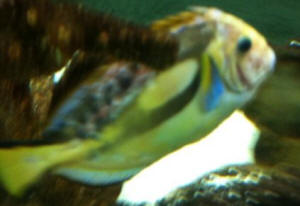 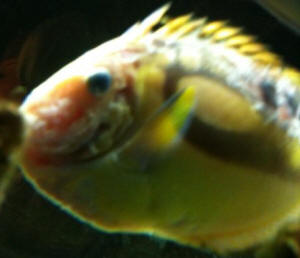 |
Hippo tang still sick? 11/10/09
Hi Bob,
<Reuben... on rye a fave>
After taking your advice and putting my yellow tang into a colander for
a few days and putting my hippo back in the tank not a lot changed, he
did start to eat a bit of food if I put it near his mouth, so after 5
days I decided that I didn't want to leave the yellow tang in the
colander so put him back in the tank but put a panel in to separate the
tank in two.
<Okay>
It's now been nearly 3 weeks since I put the hippo back and
although he has been eating a bit of food if it is put near him he
still hasn't started to swim about the most I've seem him do is
swim up a little go White and then quickly 'fall' back down
almost like he may be struggling to swim properly or he has gone blind.
What could be causing this?
<Mmm, damage from collection/shipping, genetic heritage,
psychological input...>
Thought he may recover because he started eating but he seems to be in
the same situation as he was when I put him back.
Any help would be much appreciated.
Reuben
<You seem faced with three options... to wait and hope, to move this
fish to another system, or to give it to/place it with someone else.
Bob Fenner>
Regal\Hippo\Pacific Blue Tang Health: Reading\No Useful
Information 4/2/2009
<Hi Nicole>
I have a blue hippo tang and he is laying on the bottom for the tank
breathing hard and his tail fin has turned a reddish color.
<Not good, likely an infection>
He is also going to the top of the tank every so often and bobs up and
down spitting water. I have tested the water and taken the water to
professionals to test the water and there is not a single test that
shows any water problems.
<How big is this tank? How is it set up?, and what else is in there
with it?>
I have never seen the fish eat but I put seaweed in the bottom of the
tank and has disappeared I am not sure if he is eating though.
<How long have you had this fish?>
I was thinking that he might have Ick so I changed water and put in an
organic Ick Attack.
<Hmm, no, this is not a sign of Ick: read here:
http://www.wetwebmedia.com/infectio.htm
>
Not thinking he's going to make it but any suggestions what could
be the problem?
<Need more information than what you have given to best answer your
question. In the short term, get the Tang out of your main tank and put
into a quarantine tank and start treating with an antibiotic such
as
Maracyn.>
Nicole
<Mike>
Re: Regal\Hippo\Pacific Blue Tang Health:
4/3/2009
Hi Mike
<Hi Nicole>
The tank is a 110. it is equipped with a wet dry filtration system. The
other life is:
a sea anemone <What species? These can and will sting fish.>
horseshoe crab <Dismal survival chances in an aquarium, read
here:
http://www.wetwebmedia.com/hshoecrabsart.htm >
4 in damsel <Species?>
1 in damsel, <Species?, Potential grouper food>
2 in yellow Tang,
1 in Clarkii Clownfish, <Grouper food>
1 in Clownfish <Grouper food>
7-8 in panther grouper. <Needs a big tank - 200+ gallons Read
here:
http://www.wetwebmedia.com/basses.htm
>
I have had the hippo tang for about 2 weeks. Have a feeling the fish
was sick to begin with. it is a large one 7-8 inches <If wild
caught, at a size that does not adapt to captivity easily>
<OK, we have a bunch of potential causes here. It is possible the
fish was sick to begin with. Hippo Tangs do tend to be more delicate
than others.
That said, there are a few possible causes in the tank. Possible sting
from the Anemone, harassment from either the Damsels or the
Grouper.>
<Again, please get the fish into a hospital tank and start treating
for infection.>
Nicole
<Mike>
Seemingly ill Blue Surgeonfish 3/25/2009
Good day WWM crew,
I have a concern regarding one of my long time fish and I was hoping
you could help me with some ideas.
The problem is regarding my pacific blue tang / Blue Surgeonfish /
Paracanthurus hepatus. The fish physically looks healthy (no odd
markings, scale problems, bloating, discolouration, or fin problems)
and yet it is acting as if it will be dying soon (swimming upside-down
in quick bursts and mostly laying in vertical stillness in corners of
the tank; as well swimming in strange circular patterns when it appears
to get spooked).
<Yikes... I hope I am not too late...>
I noticed that approximately two months ago, the fish became very
passive (basically overnight) usually staying in the back corner of the
tank and only coming out to eat. Due to its healthy physical
appearance, I was hoping that the fish was doing this on a temporary
basis. It kept this act up until the other day (which I did not like,
but I could not think of anything that would be wrong with it). It was
about a day or two ago that it started to act very strangely as
mentioned above.
Any help regarding this would be much appreciated. I feel that the fish
may not recover, although I still hold some hope. Please note that as I
mentioned above, the fish physically looks as healthy as I've ever
seen it.
<Something is very wrong if this fish is inverted... I would be
checking your dissolved oxygen, or better, just executing a large water
change, lowering your Spg, adding circulation, surface agitation...
This tang is easily mal-influenced by low DO... this is likely the
problem here. Bob Fenner>
Tank overview:
72 Gallon tank with 1/5th live rock and about half a dozen small-medium
corals (none with strong stinging capabilities).
5 fish in total including 2 clownfish, an angel fish, a yellow tang,
and the pacific blue in question. The tank has about 3 hermit crabs, 5
snails, and 2 brittle stars.
Water quality is not perfect but is fairly good. It has been fairly
consistent for over a year.
The tank has been running with very few changes for around three-five
years now.
The surgeon fish in question has been living well in the tank for over
two years now. It was about 5cm in length when it was added to the
tank. It is now roughly 12-15cm in length.
In terms of lighting, the tank has 2 150W 10k metal halides that run
for approx 9h a day, and two 96W actinic power compacts that run for a
total of 11h per day (on 1h before the halides and off 1h after the
halides).
Tank temperature is maintained around 78F + or - a degree through the
course of the day.
Filtration and water flow in the tank includes: A UV sterilizer,
protein skimmer (always on), canister filter (always on - currently on
a variable flow output, but had been maintained on a constant flow up
until a month ago), and a pump (always on) for additional water
circulation.
Fish diet currently consists of two types of flake food (not the best
diet I know...). Those are Prime Reef Flakes and Formula Two Flakes, by
'Ocean nutrition'.
In terms of tank deaths, it has been over a year since I've had a
fish die, and about 6+ months ago a clam I had in the tank died
off.
I believe that about covers the situation. Any thoughts would be much
appreciated.
Take care guys,
John
|
Sick tang... 11/19/08 Could you please help
identify these for me. I am researching for someone else . From
my understanding the owners of these fish had said, this appeared
over night. I have seen this on other fish in the past but not
able to pin point what it is cause or treatment. those fish
perished. Any help would be greatly appreciated Lynn <... the
marking on the Paracanthurus looks to be the result of some sort
of physical trauma... the Clown... is worrisome... overnight?
This might be Mycobacterium... perhaps Brooklynellosis... need
better, close up, even microphotographic imagery and staining to
discern. Bob Fenner>
Re: sick tang. Paracanthurus 11/20/2008 Dear
bob Thank you for taking the time to get back to me on this
.Unfortunately the hippo tang passed away 24 hrs upon onset of
this odd color change.. I have seen it in the past a few times.
Although it tends to be common with blue hippos when they are
smaller and more susceptible to disease when purchase at such a
young stage.. <Yes> All with the same signs of blackening
and within 24 hrs death.. I stopped purchasing such small fish
due to this similar signs and not knowing how to help.. is it
possible that this could also be a similar strain of virus that
appears darker on the tang? <A virus? I don't know> due
to its natural pigment? Please tell me your thoughts on this..
Whatever is the cause it kills within 24 hrs.. Thank you again
for your time Lynn <Is very strange... frightening. Have also
seen this "sudden death syndrome" on other
Paracanthurus. Again, I'm not aware of the causative
mechanism/s. Bob Fenner>
|
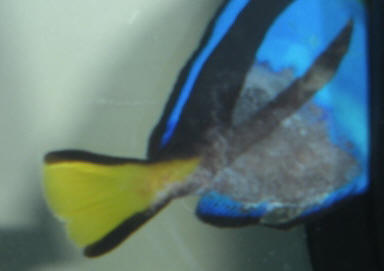 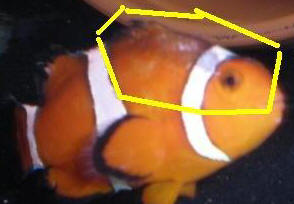 |
|
Possible Hole-in-the-head in a Hippo tang. More
9/29/08 Hello WWM crew, <Miguel> I'm new to
the salt-water part of the hobby and I'm trying to figure out
how to help this little guy/gal. I would like to narrow down what
I'm treating before I use any medicines. I unfortunately
started the tank before I found your great web site and I hope
I'm not screwing up too bad. The set up: 75 gal tank started
July 2008, 80 lbs live rock, 100 lbs fine Oolite aragonite live
sand (live sand not really necessary/wasted extra money after
reading your site), Prism deluxe protein skimmer (purchased
before reading your reviews and planning to upgrade), Magnum 350
canister with a micron filter changed/cleaned every week or two
depending on conditions. <Part of the issue here> Once a
month, charcoal used in Magnum for a couple of days ( 2 to 3).
<I'd just leave the carbon in> The outlet hose of the
magnum goes through a "squid" unit (Switching Current
Water Director and I have two Maxi-Jet 1200 power-heads attached
to a Red Sea Wave maker. The latest water parameters: Temp 80F,
Sp Gr 1.025, Amm 0, Nitrate 0, <Really? Surprising> Nitrite
0, pH 8.4, Alk 3.92, Ca 420, Phos 0, Cu 0. 10% weekly water
changes using R/O water purchased from the LFS. Nothing is added
without testing for it first except for Iodide (hoping to get a
test kit soon) which is supplemented as per the Seachem
"beginner" instructions on the bottle. The fauna: 2
Peppermint Shrimp (which took care of a minor Aiptasia outbreak
on the LR), 3 Turbo snails, 5 Red legged hermit crabs, 3 B/G
Chromis, and 1 small Hippo tang ( purchased before knowing 75 gal
tank is not adequate size). 1 frog-spawn, 1 button polyp , 1
Evergreen starburst polyp on a controllable area, and 1 carnation
(again I wished I would have found your site before purchasing
but it has grown is size). The tang was purchased and place in a
10 gal QT. 2 weeks later it broke out with Marine Ich. The little
guy went through copper treatment (Cupramine) <... killed off
necessary gut infauna...> very well and was kept in the QT for
6 weeks post treatment. He was finally placed in the main tank
and was doing great...until 2 weeks ago. I noticed a single
small, white tuft-like growth on the right nares. He was getting
superficial scrapes from the LR so I kept an eye on the area. The
tuft remained unchanged for nearly two weeks and no new ones were
appearing. The fish continued to eat and was fairly active.
Within the past week things have rapidly progressed. The tuft
fell-off and now there is a nice sized ulcer under the area (see
picture WWM3) The fish also has lost a tremendous amount of body
weight and is looking emaciated ( see picture WWM2). <I see
both> He is still attempting to eat (Ocean Nutrition Prime
Reef flakes, Frozen Mysis shrimp and Nori is offered but has
never really eaten it). I noticed he is swimming with his mouth
slightly open and appears not to be able to close it (perhaps
from the muscle atrophy). I moved him back to the QT tank and the
questions I have are: does it look like hole in the head and if
so can I dissolve Metronidazole tablets in the 10 Gal QT tank.
<Mmm... not what I would do> Is there a better
antibiotic/treatment to use? <Really... root issue is water
quality, avitaminoses...> ( I'm a Veterinarian so I have
access to most antibiotics) <Mmm, though a couple of
flagellates (Hexamita/Octomita, Spironucleus) are associated with
these sorts of Neuromast destruction syndromes, the causative
mechanisms are nutritional, environmental. Even so, some folks
report (indirect) success with the use of Quinacrine phosphate...
see WWM re> Should the 3 B/G Chromis be place in the QT tank
and treated or should I wait for any clinical signs to appear?
How contagious is it to other fish if at all? <Mmm, not so
much as Tangs and Angels...> I appreciate your help and
I've learned (am learning) so much from your site. Sincerely,
Miguel Perales. <Please peruse here:
http://wetwebmedia.com/HLLESWCauseF.htm and the linked files
above. Bob Fenner>
|
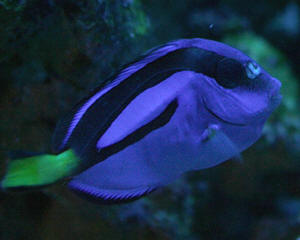 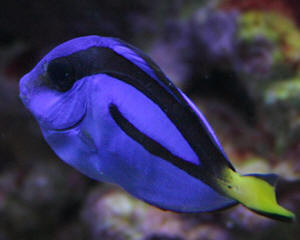 |
|
Re: -head in a Hippo tang (follow-up)
9/29/08 Thank you for the quick response. <Welcome
Miguel> Having gone through the information on your web site
and understanding that HLLE is a multi etiology disease makes it
easier come up with a treatment plan. My plan is to increase
water changes to twice a week even though the parameters seem OK.
I will start soaking their food in Selcon. My problem is this,
I've searched the LFS and no one seems to carry Selcon.
I'm going to have to order on-line so it will take a few days
to arrive. In the mean time I do have Seachem's Reef Plus
which does have Vitamins and Minerals. Will it hurt the fish to
soak their food in this product until the Selcon arrives? <Not
at all. It will help> I feel that I need to intervene soon and
don't have much time to waste since the tang is losing
interest in eating and is hiding most of the time. Thank you in
advance, Miguel Perales <Again, cheers, BobF> Possible
Hole-in-the
|
Tang Help! Hippo hlth. 08/18/2008 I
purchased a thriving system from someone who was moving to CA. It has
been up and running in my house now for 3mos and has still been
thriving. <<Ok>> A 7" Blue Hippo tang came with the
system when I bought it and has been a very healthy fish. I added my
2" Blue Hippo Tang who has doubled in size since adding to the
system. Yesterday I rearranged the rock work and added the following; 6
green Chromis 3 blue mushrooms 1 green clove polyp 1 Christmas tree
worm rock on Porites and 2 Bali tube worms <<All sounds
nice>> Almost immediately the large Blue Hippo started acting all
stressed out. Trying to find a new hiding place, even though I did not
change his old one, and breathing hard. I turned off the lights early
hoping to help relieve some of his stress, but he died overnight. Now
my smaller Blue Hippo is missing this morning for feeding time.
<<Such a shame the fish died. Could well be just stress of the
new additions as to why the surviving tang is in hiding, hope all is
well with it>> Was one of the above toxic to Blue Hippos? What
could have possibly happened to cause such a fast death? <<No,
nothing there is incompatible with a Paracanthurus. Did you inspect the
dead fish for outward marks, cuts, abrasions etc etc?? This would be
your first port of call upon death>> 125g reef tank All my levels
are at 0 Nitrates are less than 10 calcium is 500 temp is a steady 80
salinity is 1.023 <<Was the LFS water added to the tank with the
new purchases? any additives etc? There is usually a reason why fish
die, and starting off giving the dead fish an inspection, can usually
start to enlighten us as to what has happened. Hope this helps, A
Nixon>>
Blue hippo tang can't swim 7/29/08
Hello, <Josh> I've used your site for years, and have found
many answers to my questions, but I can't seem to find this one.
Here's my problem: I have had my blue hippo tang for 2+ years and
he has battled a few attacks of ich, but never anything serious.
<How "it" was treated may be> Recently (about 3 weeks
ago), I noticed he was swimming around with his head pointed down, and
seemed to have trouble swimming level. <Mmm, not good> I watched
him for a few days and did not notice him eating. By the time I decided
I should quarantine <Not advised here> and try to help him, I
didn't have the time (was going out of town for a week). So, I
regretfully left him in the display tank <Good> and gave him my
best wishes while I was gone. When I returned, he was laying on his
side on the bottom, but still breathing. I took him out of the tank and
put him in quarantine with Furazone green (the only antibiotic I have
available). He appeared almost paralyzed and would flop a little bit
when I touched him, but that was about it. After a couple more days, he
floated to the surface and bobbed around. He was still breathing and
aware of my presence (would flare out his dorsal fin when I hovered
over the tank). I decided there was no hope, so I took him out and was
going to put him in a baggy to freeze him (heard this was a quick way
of putting them down). But when I did, he started flopping and spit up
a baby turbo snail. <Interesting> He was showing more energy than
I had seen for a while, so I decided not all hope was lost. He still
hadn't eaten anything (probably about 3 weeks now), but I tried
again with some frozen Mysis. While I had him out of the water, I put
the Mysis in his mouth and he swallowed it. I put him back in the
water, and while holding him with my hand, I placed him in front of
more Mysis. He would suck them in, chew a little and then spit it back
out. But after several times of doing this, he actually swallowed it!
That was yesterday and I've now fed him three more times by holding
him and sticking his mouth in front of the Mysis. I've seen no
improvement (but he doesn't seem to be getting worse either). Do
you have any idea what might be the cause and solution of this problem?
<Mmm, only wild general guesses... Could be a matter or function of
long/er term nutritional deficiency of some sort, a
developmental/genetic issue, some legacy of collection/handling damage,
some residual chemical/treatment damage... Very likely not
pathogenic...> Could it be the baby turbo was stuck in his throat
and caused all this? <Mmm, possibly> But why is he floating on
the surface, unable to move? <Lack of food...> He shows no
external signs of problems. No visible parasites and color is good and
eyes are clear. He changed color (got pale) when I had him out of the
water, so he is still responding to stress, I guess. He is very buoyant
and floats to the surface quickly when I let him go. He cannot swim at
all, but sometimes get a little burst of energy and twitches. I am
hoping there is still a chance, since he is eating now. <There is
always a chance at living as long as there is life> Tank is a 450
reef tank with 48 other fish. <Ahh, then highly unlikely a
deficiency syndrome... but perhaps something to do with ingesting
Hydrozoan, Anthozoan... material> None of the other fish are showing
any signs of stress or abnormalities. Nothing has changed recently in
the tank. I've never seen any aggression towards him and he's
never been aggressive towards any other fish. He's always been shy,
but still got enough to eat to keep him healthy. Nitrates = 5 Nitrites
and ammonia are 0 Calcium = 400 Alkalinity = 8 Thanks in advance for
any help or advice, Josh <Were it me Josh, I would keep trying what
you are doing. Bob Fenner>
Tang In Trouble (Mystery Malady or???)
7/13/08 Hi, <Hey there! Scott F. in today!> I have had a
Hippo tang for about 6 weeks. Three weeks in quarantine; three weeks in
the main tank (95 gal; asst corals; several misc. fishes). <I
commend you on embracing a quarantine procedure!> Since I placed it
into the main tank, he has been mostly hiding in the live rock, with an
occasional venture outsides this protection. For the past few days, he
has been very lethargic. If finally have been able to
"capture' him and place him in a QT. He is on the verge of
death, but I would like to do whatever I can to save him. Any
suggestions? Thanks, Fred <Well, Fred, general lethargy can be the
result of many different potential issues, ranging from poor
environmental factors to disease. You'll have to do some detective
work and ask yourself some questions here. I don't have much to go
on. I'm assuming that the fish was eating well and showing no signs
of illness during the quarantine period, correct? It is not uncommon
for a fish to hide for some period of time upon introduction to his/her
new home. However, for the fish to be in such severe state of lethargy,
there must be something else going on. Is there a "bully" in
your aquarium that is harassing this fish? Are all primary
environmental parameters (temperature, specific gravity, pH, ammonia,
nitrite, nitrate) within acceptable limits? Is this the only fish in
the aquarium that is acting in such a lethargic manner? Are there any
other telltale signs of disease, such as rapid breathing,
discoloration, excessive mucus, bumps, spots, or other obvious body
traumas? Has the fish been eating with any degree of regularity? I
think that you're going to have to remove this fish for closer
observation and possible treatment, if there is a disease to treat.
Quiet conditions and stable environmental parameters in the quarantine
aquarium may help bring this fish back, but it is hard to know.
Administering a vitamin product, such as Vita Chem, into the quarantine
aquarium's water, might help perk the fish up a bit. Before you
begin bombarding the fish with drugs, it's important to know
what's going on, of course. Like I mention above, it's really
tough to diagnose this fish based on the information that you
described. I'd key in on either some illness, or obvious trauma as
a culprit. If the condition was caused by environmental factors, the
other fishes in the aquarium would have showed signs. If it is an
obvious disease, such as Ich, there likely would be other fishes
affected. In the end, you're going to have to get this fish into a
quarantine aquarium and observe him/her closely before deciding on your
next course of action. Sorry I cannot give you more specific advise,
but I hope that the questions that I asked, and the fish health
resources here on WWM, help you use deduction to determine what is
wrong with this fish. Good luck! Regards, Scott F.>
Re: sick Hippo tang In Trouble (Part 2)
7/18/08 Hi Scott, <Hello again.> Thanks so much for your very
interested reply. <Hope it was useful for you.> Addressing your
concerns; 1. All other fish seem do be doing fine, eating well. 2.
There is no apparent 'bullying'. 3. I keep a close watch on
water quality and there is nothing out of acceptable range. 4. Ich does
not seem to be present. <All encouraging signs, to a certain
extent.> That being said, I regret to inform you that the little guy
has passed on to his next life. <I'm sorry to hear that.
It's never easy to lose an animal.> His color was not good and
he seemed to be very thin. I really think that he starved to death.
<It is entirely possible. Perhaps he was subjected to collection
trauma, such as improper handling, decompression sickness, chemicals,
etc., which resulted in his demise.> In reviewing the entire
experience, I think that I was premature in moving him from the QT tank
into the display. During the QT period, I was mostly looking for Ich
(knowing how the species is susceptible to such). He may have not
settled into eating well in the time allowed. Then the stress of
another move was more than he was able to handle. Obviously, this is
only speculation on my part. <Yes, but you might be on to something
here. Remember, the quarantine period is not just for looking for
disease- it's also for "hardening" new arrivals- waiting
for them to begin to eat and regain strength.> However, I will use
this experience and be certain that in the future any fish must be
eating well before being move into the main tank. <Excellent!>
Thanks again for your help. Peace, Fred <Sorry to hear of your loss,
Fred. However, your experience may benefit fellow hobbyists, and most
importantly, the fishes that we keep. Your Tang may have not died in
vain. Best of luck to you! Regards, Scott F.>
Hippo Tang, hlth. 5/29/08 Hi WWM Crew
<Carol> I consider your web site invaluable in resolving problems
I have encountered over the years. I am so upset over the sudden loss
of my Hippo Tang and hope you can shed some light on what might have
happened. I purchased him as a 'baby' over 2 years ago and he
has grown and thrived. Yesterday when I came home from work there he
was, my pride and joy, dead on the gravel. I was stunned. He had eaten
the night before and showed no signs of any problem. I immediately
checked the water parameters and everything is fine. All of his
tankmates (1 clownfish, dwarf lion, goby) and my anemone and mushrooms
are all OK. I checked the tang for damage and could not find anything.
He did not have Ich or HLLE. I read Mr. Fenner's book about changes
in water temp, but that checked ok also (80) Any idea what might have
happened to him? Thanks, as always, for your advice. Carol <Am sorry
to read/realize your loss... there are a few sets of speculations re
these "sudden death" events root causes... One that should
receive credence is that fishes, though they seem "adult",
compared with tetrapods (the so-called higher vertebrates) are not
"genetically mature" as mammals, birds... and do often (a
relative term) perish from pre-determined coded flaws... Another
possibility here might be some sort of enhanced stress from the
presence of your anemone and mushrooms... these disparate Cnidarians
don't "like" each other, and their chemical warring does
wear on fish livestock. Some input re this last phenomenon and actions
that can be taken to alleviate it can be perused here:
http://wetwebmedia.com/cnidcompppt.htm Bob Fenner>
Re: Hippo Tang 05/30/08 Thank you,
Mr. Fenner, for your reply. I have been in this hobby for many years
and thought I had it down to a science... and then something like this
happens. It is very discouraging. <I do sympathize.> You should
know that the 'Conscientious Marine Aquarist' is by far and
above the best book I have read (from cover to cover) and is my bible
when I look to purchase my 'obsessions' : > <Ahh!
BobF>
Blue Tang Problems 04/05/2008 Hi All,
<<Hello, Andrew today>> I have recently been having some
trouble with a Blue Hippo Tang in my 75gal reef aquarium. It has begun
scratching on the rock work in the tank more frequently than normal,
and has numerous raised bumps on it, about the size of a pinhead, and a
few of them are white. I originally thought it was Ich, but as none of
my other tank's inhabitants (2 percula clowns, 1 coral beauty, 1
Hawkfish) have had any symptoms or odd behavior, I figured it was
something else. The tang has had this problem before, though not as
badly as lately and those bumps usually went away within a few days or
so, but this recent outbreak has lasted about 5 days now. My water
parameters are pretty good, 0 phosphate, 0 nitrite, 0 ammonia, 2.5
nitrate, pH 8.3, salinity 1.025, calcium at 450 and Alk at 8, so water
quality shouldn't be the issue. I am inclined to think it is
something fungal on the Tang, and if so, what should be used to treat
it? I have been soaking the food in Selcon and garlic alternately to
try to help out. The tang eats very well, I usually feed Formula
flakes, pellets and frozen foods, I tried to get it to eat Nori and
seaweed, but it refuses to eat anything off a veggie clip. Any advice?
<<Does not sound fungal to me, it does sound like Ich, and Ich
that has not gone away from a previous infection. I would suggest
moving the stock to QT and treat with hyposalinity and monitor all.
More can be read here http://www.wetwebmedia.com/ichart2mar.htm
>> On a hopefully unrelated note, I have been having some
Cyanobacteria problems for a few months now, it will grow on the rock
and glass until I siphon it off during weekly maintenance, and then
grow right back. Skimming through some of your files here at WWM, I
read that the DOC's from frozen foods can fuel Cyano growth
<<Potentially, yes>>. I usually feed one cube a day, and
until very recently, hadn't decanted the 'juice' out of the
cubes, would that be the source of the problem? <<Quite possible,
yes. The juice from the frozen foods contain a high amount of phosphate
(even though some foods say they don't). Cyano can appear from a
few things overfeeding, too much light (lighting period), high
phosphate and nitrates, flow....One of these area's are providing
the means for the Cyano to bloom>> Thank you for all your help,
your services are invaluable. Kindly, Daniel <<Thank you for the
questions Daniel, hope this helps. A Nixon>>
African Yellow Belly Tang with large bump
2/14/08 We're having a bit of a problem with our African Yellow
Belly (Regal) Tang. We've had him in our tank for about 14 months
(that was well established when we added him). He's eaten like a
champ from the beginning (formula two, seaweed clips, brine and Mysis,
clam, Spirulina, garlic, a liquid supplement to soak food in, and
another frozen product that is made up of healthy "greens"
that we mix with the meaty fare). He had a bad outbreak of ich, which
we treated with a freshwater dip and No-Sick Fish, product worked
immediately, but he has developed a single large bump on his forehead,
that seemed to pop-up overnight. I thought it might be from the ich,
but it is blue (skin tone) and protrudes like a unicorn's horn,
just below his top fins. He seems to have recovered from the ich, his
color is coming back rapidly, now this! <The bump?> The water
quality is excellent, we've done several water changes and have
been very careful in monitoring our prize fish. He does seem to be more
timid than usual, I have attributed this to the ich outbreak, your
thoughts? <Perhaps the treatment... though NSF does not list
ingredients> Nitrates, Ammonia, etc. are at undetectable levels,
temp. is holding steady at 80 degrees, ph. is steady as well. Any idea
what this could be? I've browsed WWM, RC and contacted several
LFS's and still have no idea what to do. Please Help! Thanks! Kyel
<Maybe a tumorous growth of some kind, perhaps the expression of an
embedded parasite... Necropsying the bump area... sectioning, staining,
looking under a scope... is about the only means of being sure here. I
would not treat for this mass. Bob Fenner>
Blue Hippo Tang Question 1/17/08 Hi Crew,
<Dane> I am new to the world of marine aquariums but have
been immersing myself in the literature this past month (including
CMA - a fantastic book.) Anyhow, I got a great deal on a complete
55g setup with everything included, the tank is cycled with all
water parameters in order. At the same time I purchased and set up
a QT, and a week ago I purchased my first fish: 2 false Perculas
and a blue hippo tang. My question pertains to this tang: When she
(I'm just using she for ease of expression as I don't want
to call her "it") first arrived she spent a lot of time
hiding which I found out was very normal. For the past week though
she's started roaming the tank a bit more, especially when she
thinks I'm not looking. She's also been eating
garlic-soaked Nori and picking at the clowns' flake food.
However, today I got home and she seemed paler than usual. I also
noticed that she appeared not have touched her Nori (it's
normally all gone from the clip by the time I get home.) She was
also very subdued. Water quality was all fine. Nevertheless I still
did my daily water change using water from the display tank. Have
just checked and water from both tanks is good: Amm: 0, Nitrite 0,
Nitrate 0, PH 8.4 (a little high I know.) <Is fine> So my
problem seems to be that she's not eating and is now swimming
around the tank a lot following her reflection. <May be a clue
here... I would darken an end panel (place a piece of paper over
the outside) to rid this reflection> Also, the paleness seems to
be an issue and her breathing is rapid. It just seems like a big
change from how she's been acting this past week. Am I being
paranoid? <Mmm, no. Just observant and cautious> I've
included a few pics I just took to see if that helps you at all.
(Just the fact I can even get near enough to the tank to photograph
her is weird - normally she'd go and hide even if I walked
past!) Thanks for your help. I've been using this site everyday
to answer questions I have and to supplement what I've gleaned
from books. It is such a valuable resource to have. Keep up the
good work!! All the best, Dane <I take it you've already
read re Paracanthurus on WWM... but please do review here re
feeding: http://wetwebmedia.com/paracfdgfaqs.htm I would expand the
food selection and try soaking in a food stimulant (e.g. Selco/n),
ahead of offering... and be patient. Bob Fenner>
|
|
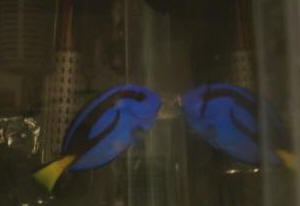
|
Hippo Tang... not
reading ahead of purchase, writing... hlth.?
7/30/07 Hi! I am new to this forum but have found the info here to
be very useful. I bought a hippo tang about 3 days ago, it is only
about 1 - 2 inches long. Her behavior has been odd. The first night she
turned colors and laid on the bottom <A "normal" behavior
of/for this species> of the tank almost pale white, I tested all the
levels in the tank and every thing was perfect. The next day, she was
bright and doing great. Today she is acting strange again, she is
brushing up against the hermit crabs that we have in the tank and we
found her a little while ago under the largest crab almost being bit by
it. <Yikes! Hermits are often opportunistic predators...> We took
the net and pushed the crab off. Now the Hippo is turning pale again,
may possibly have some pinch marks and is swimming at the top of the
tank, almost bobbing up and down. Is this just stressed behavior or do
you believe that she is not going to recover from the crab? Any help
would be greatly appreciated. Thank you, Julie Riggs <... no info.
of use here... re the system, history, water quality values/testing...
Foods/feeding, tankmates... No quarantine? Please, read here:
http://wetwebmedia.com/paracant.htm and the linked files above. Bob
Fenner>
Hippo Tang With Dotted Line On Sides, A.K.A. HLLE -
04/17/2006 Dear Crew, <Hi Mike.> I have a problem with my
Hippo Tang. I looked on the site, but since I have absolutely no idea
what it could be, I didn't know what to search for so my searches
resulted in nothing. <Try Google searching with the symptoms, easier
than trying to guess where to start reading.> The fish appears to
have, on both sides, <A good clue.> a white line, dotted. It is
faint, so i can't tell if it is raised. The line starts above the
eye and runs through the black portion of the side. <I see. Sounds
like this could be HLLE (head and lateral line erosion).> The fish
is acting normally except for occasionally scratching itself. I am
treating it with CopperSafe at the moment. <Stop this, not going to
help you. This is likely a simple case of poor diet. If still
new/faint, can be quickly reversed. Curable at any rate.> I hope you
can help. <Read up here http://www.wetwebmedia.com/hllefaqs.htm and through
the related links. Be sure you know of and meet your tangs nutritional
needs.> Thanks, Mike <Sure thing. - Josh>
Unusual Blue Tang Disease
2/23/06 Hello, <Hi there> I have a Blue Tang in a Q
tank. He had ich, but seems to be cured of it for a couple
of weeks now. I used hypo-salinity, fresh water dips, and
some medication to treat him. He gained a bacterial
infection in between treatments, but now is doing much better (after
treatment for that). Now, he has two different problems. One
is that he has several areas on the sides of his body that are
discolored. <Not a big deal... these will re-color with improvement
in the environment> The areas look like he has light fading in his
normal coloration. I think this may simply be due to stress.
I have stopped dipping him and have tried to leave him alone as much as
possible, and these areas seem to be getting better. <Yes> He
looks perfect from 3 feet away, but very much affected from 6 inches.
The other, more critical (?) problem is that he has a pimple on one
side of his abdomen. He had this once before, in the same
spot, when I was treating him for ich. It looks just like a
pimple on someone's face, but there is not a substantial
"whitehead." It is pointy on the
top. The total size is only about 1/16" (width and
height) on a 2.5" fish. This is easier to see than the
dis-coloration, but indiscernible from a few feet. I caught
him flashing on that side a few times on one occasion. Is
this a bacterial infection? <Not likely... and not likely
"treatable" or something you want to fool with, nor
catching...> I would like to get him back into the main tank some
day. Thanks, John <I would do this at your earliest convenience. Bob
Fenner>
Hippo Tang Health / Aquarium 11/7/05 Good Afternoon
Guys... <...and there are some ladies here...> Love the website -
over the years, I have gained a wealth of knowledge from your forums.
<Ah good> Currently have a 90 Gallon Fish Only / Live Rock Tank
with an additional 40 gallon sump area. Tank has approx 100 lbs of live
rock and 60 lbs of crushed aragonite substrate. Tank has been stable
for over 3 years now. Along with normal wet/dry filtration, I run a
skimmer, a UV sterilizer and Purigen filter packs (that seem to control
Nitrates amazingly). Water Parameters: Temp 80F, Ammonia 0 ppm,
Nitrites 0 ppm, Nitrates <10ppm, pH 8.3, buffer capacity seems
good. At this time, the only fish in my tank is a beautiful Hippo
Tang (approx 7"). I purchased the fish about 4 months ago, when it
was about 4" and seems to have grown quickly. In the coming
months, I plan on adding a couple of clown fish and a long nose
butterfly... and maybe another tang (last, possibly a Sohal) <Mmm,
this tank is actually too small... for such an ultimate bully> - but
I'm fully aware of the problems overstocking can cause. This Hippo
is so cool looking, I am actually considering leaving him as the only
tank inhabitant. I know these guys can be temperamental and sometimes
difficult to keep happy... this one seems like he's pretty happy
and adding other fish might cause him some problems, I'm not sure.
My water quality seems good, the water is crystal clear and the fish
has the entire tank to himself. About 4-5 weeks ago, I noticed the fish
rubbing up against the rocks and substrate. <Some such rubbing,
glancing is normal> I checked for "white spots" (possibly
Ich) and found nothing. The fish is quite fat, eats everything in sight
and swims all over the tank very actively. Unlike most Blue Tangs, this
guy is quite personable and doesn't hide when I go to feed... quite
the opposite, he comes right up to where I put the food in the tank.
The fish also grazes off seaweed on a clip and eats the algae off the
rocks and glass. Also, in the past 2 weeks, every other day, I crush a
little garlic and add it with the flake food... the tang absolutely
loves the garlic and seems even more active and colorful, since I
started adding the garlic. My questions are general, regarding the
health of the fish and the aquatic environment. The Hippo continues to
rub against the substrate, not constantly, but certainly as the lights
dim at the end of the day... yet shows no other signs of ich or stress.
With the water parameters testing well and the water looking good, I
have tried to avoid water changes - since (in the past) that's the
process that has caused this fish a little stress. I do add trace
elements (Marine Trace) every week. Everything I read on the internet
talks about fish rubbing up against rocks and substrate indicative of a
parasitic disease (like Ich)... but should there not be some kind of
physical symptoms? <Would be if there "was a
problem", yes> Also, in the last month (which coincides with
this behavior) I've noticed very small amounts of bright green
algae growing on the top of some of the live rocks. It's actually
quite attractive, and the fish likes to "eat" from it -
although it's a very fine covering on the rocks. Is this algae
growth indicative of any problem in the water that I'm not testing
for? <Mmm, nope> I don't want to disturb the environment for
this Hippo, since he appears to be VERY happy, and I think changing
anything might do more harm than good... but is there anything obvious
that I should be doing / testing for, or am I concerning myself about
nothing? <Same old water quality parameters, particularly pH...>
Finally, if I am to add other fish - do the fish above seem OK, or
should I add a cleaner shrimp... any ideas would be appreciated. <A
cleaner shrimp would help. Careful selection, acclimation and
quarantine of new livestock requisite> Thanks, hope I didn't
take up too much of your time. Jeff <Cheers, Bob
Fenner>
| Hippo losing black on face? Age, Good
Husbandry Should Solve - 10/24/05 I have a hippo that I bought
from a LFS that was emaciated, beat up by damsels, and had some
serious fin rot. He is about the size of a half dollar right now,
<Better to be collected/sold at a few inches in length> and
although I have gotten his fins to regrow and fattened him up in a
6 week qt, a few months later a portion of his nose and the area
around his mouth seems to be fading in color (see attached pic).
<Nice photo... mainly shows "normal" growth, color of
the area> It is hard to see because he never stops moving but it
doesn't look like it is pitting, just losing color, and his
lateral line looks fine. I feed him formula 2, Cyclop-Eeze, and
prime reef (flakes, he ignores frozen even when it's soaked in
garlic or VitaChem). He occasionally eats some Nori off a clip, but
he usually picks at the microalgae on the rocks. I'm puzzled
because he is very active and seems otherwise healthy. What can I
do to fix this??? -Arik <Likely not a problem here...
maintaining optimized water quality, providing vitamin-rich foods
as you are doing are the best means of preserving color and
vitality. Bob Fenner> |
|
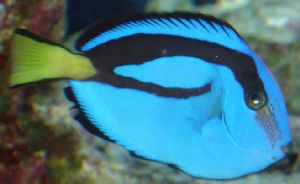 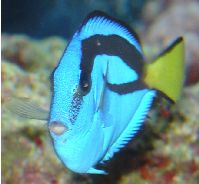
|
| Hippo Problem, Not enough info 9/23/05 Hello,
<Hello Adam J with you.> Can you tell me if my Blue Hippo has
a disease or just maybe skinned his head on the rocks? <What do
you mean by skinned? Does it look like an abrasion, discoloration
or something else'¦.? I'm sorry to say I can't
tell you much from your description. A more detailed description
would help and a picture would be best. Although I can say it is
not uncommon for Hippos (Paracanthurus hepatus ) to scratch
themselves when wedging in between rocks. But to reiterate form
your description I am uncertain as to the diagnosis.> He was
fine last night. He is eating well and swims normal. <A good
sign.> I know if you catch a disease quick, you can normally
beat it. <Only if you can I.D. it though.> So a fast response
would be greatly appreciated. Thanks and God Bless! Curtis
<Cheers, Adam J.> <<May be the beginning/s of HLLE...
nutrient (avitaminoses) and/or water quality related. Please read
re this neuromast degenerative condition, the species health on
WWM. RMF>> |
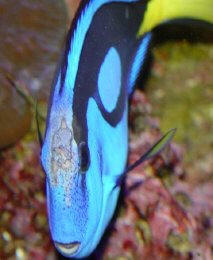 |
Question regarding Regal Blue Tang 1/8/07 Dear
Bob, <Hey Amir, JustinN with you tonight, sorry to disappoint
*grin*> Your website is one of the best websites ever honestly. I
have learned so much about tropical and marine fish . it's
unbelievable. Thank you. Thank you. <I thank you on behalf of the
entire crew, it is truly a labor of love.> I am new to the marine
fish keeping so kindly excuse my sometime stupid statements or
questions. <Hey, we all start somewhere!> Also I wasn't able
to locate a place on the website where I can pose a question to you so
taking the alternate way to get in touch with you directly (via your
direct email). <This is in fact the method for contacting regarding
a question. See this page for information on our question and answer
conventions: http://www.wetwebmedia.com/WWMAdminSubWebIndex/question_page.htm>
The situation is that I have about 5" or so Regal Blue Tang which
was one of my first fish in my 55 gallon with lots of personality and
quite healthy. I had that fish for about a year and during that it had
survived two big outbreaks of ich which only affected him. <Mmm, no.
Only showed on him, all were affected.> But using the dip method
prescribed by you and garlic laced fish food really helped it to
recover. <Was a quarantine/fallow procedure followed here? If not,
then the ich remained in the tank.> Now about 2 months or so ago, I
had upgraded my tank and the Regal Blue Tang along with its partner in
crime the Yellow Tang were both slowly moved into the new larger tank
which currently had about 40 lbs of rock and some corals. The water
parameters are perfect. <Actual numbers are much more helpful
here.> I am using a Coralife super skimmer for 120g tank and 2
powerheads as well as a Fluval 404 to give you some idea about the
equipment. <Amir, you don't mention what size tank you upgraded
to. I feel I must mention that your Regal Blue tang was in a woefully
too small setting for a long period of time, and this may just be the
effects catching up. Zebrasoma sp. tangs such as your yellow tang
require a minimum of a 75 gallon aquarium for a healthy lifespan, with
a Regal Blue requiring a minimum 100 gallon for its duration.> The
problem which I noticed was that the blue tang now seem to be laying
down on its side in one of the crevices more often (used to do it
before in the 55 gallon but only for a short while) and the stomach
seems a bit pinched and the bright blue color it used to had seem to be
fading a bit and become lightish or whitish blue. <The laying
behavior you speak of is very common with these fishes, however the
pinched stomach and discoloration are disconcerting.> Now there are
absolutely no ich in the tank and there are no white spots on the fish
nor it is showing any scratching behavior <Mmm, if you never treated
your tangs in a quarantine tank for an extended period, while leaving
either the old 55 gallon or the new tank fallow for a 6 week period,
then your tank does in fact still likely contain the parasites.> and
the best thing is when it comes time to feed, it is still crazy as
before and would even eat from my hands. <Very good> I am
currently feeding my fish NLS marine fish formula, frozen foods (mostly
plankton, mysis shrimp and blood worms) as well as Cyclop-Eeze and
dried sea weed. <Excellent.> I will be more than happy to provide
you with a before and after picture of the fish but was hoping that
based on the information provided above, you might be able to give me a
fairly good feedback on how to get the regal blue back to its original
shape. <Well, Amir, it reads to me like there's something amiss
in your water quality, either an excess of nitrogenous wastes, or some
other factor not directly visible. May I ask, what do you test for in
your tank? Ammonia, nitrites, nitrates, pH, calcium and alkalinity? How
about your make up water, are you using water from a Reverse Osmosis
system, or dechlorinated tap water? Beyond these possibilities, my only
other thought is that the potential stunting of being in too small of
quarters is beginning to show in this specimen, but I cannot say with
absolute certainty.> I sincerely thank you for your time and advise
in advance. Best Regards, Amir Sherani Toronto, Canada <Amir, I
don't feel I've been terribly helpful here, but beyond what
I've pointed out, nothing really appears amiss from your
descriptions. Feel free to shoot back some more info as I've
outlined, and I'll gladly take a closer look. -JustinN in Texas>
Sick
tang? 8/20/05 Hello, <Evening> I am having troubles
with a Blue Tang I recently purchased. I have read tons of
FAQ's and Googled till I'm blue in the face, so I thought it
was worth asking the crew. <Fire away, that's what we are here
for.> At the petstore there were three tangs: 2 about an
inch long and this one was about 2 inches. I picked out the
larger one and he was kind of hiding out underneath a
rock. I didn't think anything of it (next time I will).
<Yes hiding fish or inactivity is usually a sign of disease or
stress. Best to avoid these fish and make sure all your fish eat and
swim well in the store.> Anyhow, after acclimating and releasing, he
sat on the bottom of the tank. This was fine, until hours
later he was on his side, frantically moving his fins. I
have had him for about 3 days and he hasn't moved. He
lays on his side, just breathing, and moving his fins. It
appears as if he is trying to get under the live rock but it is not
possible. There is nothing wrong with my water (that I know
of at least. 0 Ammonia, 0 Nitrites, 15 Nitrates, pH 8.3, Sal
1.025, 78 degrees). First I thought he was deprived of
oxygen but that was not likely the case and I even added another
powerhead w/ air intake and saturated the water w/
microbubbles. He hasn't eaten any foods since I've
had him. <hmm no Q/T? It may be stressed out from the move or poor
handling by the store or a shipper.> I talked to the store and they
said tangs are weird sometimes when they are new to a tank or
young.<Not true generally the younger tangs just don't ship well
since they cannot tolerate the changing water and temperature
conditions of shipping as well as their larger
brethren.> I can buy that, but I can't buy the fact
that he hasn't moved nor eaten. <Not good signs at
all.> He doesn't even move at night (thought it could
be light sensitivity but doesn't appear so). He has no
visible signs of spots, film, or fin damage and his color is brilliant
(at least so far). I added some carbon to the filter to pull
out anything that may be annoying in the water. I have no
idea what to think. Is it more likely he is sick/has a
parasite or could he just be impaired or something? It
doesn't look like he has any competence or coordination. Any
suggestions would be much appreciated! Thanks so much, Mike
<Hmm. Do you know what part of that world it was caught
in? If it is a pacific blue tang, It may have been cyanided
and is now showing the symptoms of its toxicity. However it
is more likely that it is been poorly shipped and is either severely
stressed or was burned by ammonia or nitrites in transit. I
would keep the water quality as high as possible and try to coax it to
eat formula one, two, emerald entree, or any algae you have on hand
such as Nori. Also check the LFS top see if it ate for them
at all and how long they have had it in their tanks. If it
was just brought in or it never ate for them that will help you to see
what you are dealing with. If it goes on for over a week,
you cannot get it to eat, it is from the pacific ocean but not from
Hawaii, it may have been cyanided so check with the LFS, who if they
are reputable will call the distributor to ask where it came
from. If they wont tell you or cannot tell you, I would try
another store for your fish needs. Such information is
crucial to success in saltwater and if the trade of cyanided fish is
not supported such techniques will be used
less. Unfortunately the only way to truly know if it was
cyanided is to check the gills and see if they are a deeper
red. Pink is great, red is bad and the fish will die
eventually if not very soon. (Mostly this is checked post
mortem and is not possible when the fish is alive without possible
injury to the gills themselves.) I am very sorry to be the
bearer of such news. Good luck and I hope it is simple
shipping stress and it recovers.> <Justin (Jager)>
| Tang w/ possible parasite issue? 7/16/05 Hello Folks,
Thanks in advance for your help. <Welcome> So here's my
deal. I recently purchased a small hippo tang from a
very reputable LFS. Two weeks later I noticed some dark
blotches under his left eye. (see photo) I have seen no
white spots, which I would think rules out ich. So, I
showed these photos to the LFS and they suggested it could be HLLE.
<Ah, no...> I find that hard to believe because I see him
frequently rubbing the effected area against the live rock, which
makes me think it's some sort of parasite?
<No> Do you agree? And if so, how do you recommend
treating? <Time going by... nutrition, optimized, stable
conditions...> Details....I have a 120 gallon tank that finished
cycling over a month before adding the tang. All water
parameters are in check (ph 8.2, ammonia 0, nitrite 0, nitrate 0,
calcium 430, temp 79) As far as food...I've been
feeding a wide variety of foods (seaweed, formula 2, lettuce, prime
reef flake, and pellets). Today I also purchased some
Nori and Mysis shrimp that I plan on soaking in Zoe prior to
feeding. Thanks for your help! <Please read here: http://www.wetwebmedia.com/paracdisfaqs.htm and on to
where you lead yourself through the linked files above. Tangs in
general don't "like" new systems... Bob
Fenner> |
|

|
Sudden disappearance of regal tang Hello crew, <Hi there
Shrina> Love your website. We had a regal tang whom we
loved. She was friendly, spunky, just an all around good
fish. We nicknamed her "Piggy" because she loved
to eat. I saw her at morning feeding yesterday and not
since. It is unlike to miss any feedings, let alone 3
now. I am really afraid something has happened to
her. Any ideas? <... either in the tank or not... Out,
perhaps it jumped... is still there... or a pet picked it up. In,
perhaps still hiding or... not. Have you looked thoroughly under rock
overhangs, behind ornaments...? This species does "lay down"
quite a bit at times> We have a reef tank, 220 gallons. It's
aquascaped with live rock. Substrate is live sand (1 to 5 inches deep
at places). We have a protein skimmer, a
chiller. The system is quite stable. Water quality is
Ammonia 0, Nitrite 0, Nitrate 2.5 ppm. pH 8.2. The tank is
stocked with: 1 Clark clownfish 3 ocellaris 6 green Chromis 1
strawberry Gramma 1 orange spotted goby 1 blue cheek goby 2 neon gobies
1 elegant coral 1 frog spawn coral 1 Discosoma 1 leather coral 1 pipe
organ coral 3 Cynarina 1 plate coral 1 hammer coral 3 small colonies of
Zoanthids. Any ideas what happened to our sweet tang? <I hope it is
just having a "time out" and will soon show. Bob
Fenner>
Re: Sudden disappearance of regal tang Thank you for
responding so fast. I didn't think about her jumping out
of the tank. If she did, we wouldn't find
her. We have 4 dogs and 3 cats. <Ahh... more common than
you might think...> I really miss her and just hope we can find
another one as good as her. Thank you again, Shrina <Sorry for your
loss. Bob Fenner>
|
Tang In Trouble? Hello to all, <Hello! Scott F. here
today!> I have a question regarding my baby hippo Tang: When
we bought her, she (or he) was about 1", and in the past month she
is growing fast, seems to be happy and healthy (until recently). It
appears that she is developing black spots, but not just along her head
and lateral line...these bumps are also on both sides of her belly.
Plus at times she appears to have a whitish film on parts of her body.
I have looked up HLLE and other health problems on your website but I
haven't been able to find anything that definitely resembles this.
We have had our water tested (many times just to be safe) and all of
our conditions are fine. I am feeding her a much better diet,
(following the instructions for HLLE) but I am wondering, could this be
signs of a different disease? Please help, I love this tang and want to
keep her healthy and beautiful!! Thanks for taking time to help!!!
Jamie <Well, Jamie, the film that you are describing could be
indicative of a parasitic illness of some sort. However, if you're
seeing that the fish is eating well and otherwise behaving normally, it
may pay just to wait and watch carefully. If the fish is declining, and
just doesn't look right- I'd consider starting with a very
simple course of action, such as occasional freshwater dips. Granted,
these are sometimes ineffective, but they do often provide some relief
for light symptoms of parasitic infections. On the other hand, if you
are dealing with some sort of serious parasitic infection, more
aggressive treatment regimens are recommended, such as formalin-based
products. Whichever way you go, be sure to observe the fish carefully.
Do read up more on the parasitic disease FAQs on the WWM site to verify
what you may be dealing with. Let us know if the symptoms get
worse...Good luck! Regards, Scott F>
|
|
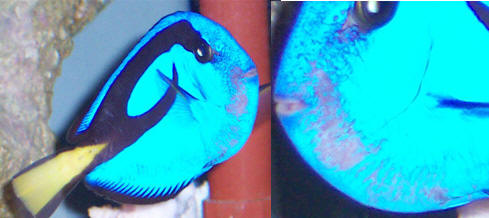
|
| Tang In Trouble? Hi, <Hello! Scott F.
hee today!> I need help on identifying what is wrong with my
Tang. This brown/pink discoloration starts near it mouth and is
growing fast. At the local aquarium they told me it could be
Velvet, but I'm not so sure. Its behaviour is changing to, it
swims with flashing movements, like nervous. I post it here because
I want to show you the picture Any Idea of what it can be? Thanks
for you time. Sincerely, Francisco Maino <Good photos,
Francisco! It's hard to be 100% certain, but it may be some
sort of fungal illness of some sort. On the other hand, if
you're seeing labored breathing, scratching, lack of appetite,
and the other symptoms commonly associated with Amyloodinium, then
you will need to take some aggressive action to counterattack (Do
see the WWM disease FAQs for details). The fish looks pretty good,
other than the discoloration, IMO. On the other hand, if this is a
fungal infection, an antibiotic product might do the trick
(administered in a separate aquarium). It might be a good idea to
do a complete workup of your basic water conditions to make sure
that things are in order. Sometimes, these types of conditions can
be cleared up with simple improvements to water parameters. Do the
tests and take any corrective measures required! Good luck!
Regards, Scott F.> |
| Mystery Malady? Hello! <Hi there! Scott F. with you
today!> I was reading your Q&A and you seem to be quite
knowledgeable about fish. <Well, we certainly try our best!>
We've recently acquired a Regal Blue Tang from a previous fish
keeper (not a store) and as far as we know, his tank was filthy and
the Regal Blue Tang seemed to always lie on its flat sides and
drift around aimlessly, as if playing dead. <Not a good or
"normal" behavior at all for this fish...> We set the
fish into there and he seemed to be quite happy in the tank (after
a brief period of wedging himself between two rocks), swimming
around and playing with the other fishes. <Yikes! Next time,
please quarantine all new fishes for a few weeks before placing
them into your display tank. Especially in a situation where a fish
is coming from a tank with known problems...> We then noticed an
odd discolouration of some sort on his head and a bit on his tail.
Enclosed are some links to pictures of the Regal Blue Tang. We were
just wondering if it was stress and bad diet (as a result from the
last tank), or if it was serious. As far as I can discern from
other images on the internet, his eye area is supposed to be a dark
black stripe across it, but it's faded and looks as if it has
been discoloured. <Unfortunately, the photos did not come in too
clear, so I cannot be 100% certain here, but this could be either
Head and Lateral Line erosion (HLLE) or a possible parasitic
illness, such as the deadly Amyloodinium (Marine Velvet). If it is
Amyloodinium, this is a very contagious and highly virulent disease
that must be treated immediately if you want to save the fish. Do
look on the WWM parasitic disease FAQs to verify if this is indeed
what you're dealing with. If you are looking at HLLE, this is
more of a "condition" as opposed to a disease (at least
in the traditional sense), and can often be placed into
"remission" with excellent environmental conditions and
quality food. I'd look into both of these possibilities, then
draw your conclusions from your observations...Either way-both of
these require some intervention on your part, but the degree to
which you will need to respond will be dependant upon which
condition that you're dealing with. Check out the FAQs for both
on the WWM site, and take the appropriate action.> I've
enlarged the photos a bit with an image resizer, but they might be
a bit blurry. If you want, I can also send along sharper
images. http://www.sherei.com/regalblue.jpg
http://www.sherei.com/regalblue1.jpg
http://www.sherei.com/regalblue2.jpg
http://www.sherei.com/regalblue3.jpg
Any help would be greatly appreciated. Thanks. :-) <Well, they
are a bit blurry, but I think the fact that you can see the fish in
person gives you the advantage when attempting a diagnosis here.
Try investigating the two possibilities that I gave you here and
let me know if you have any further questions! Hope this was of
some help. Regards, Scott F.> |
|
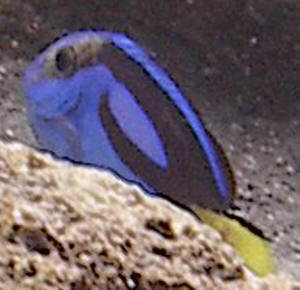
|
Needs A Dip? I am sorry to be bothering you about this
(since I should know what it is), but I can't seem to get into the
chat forum at this time. It is giving me an error message. <Well-
hopefully we can help you out here... Scott F. with you!> Anyway, my
hippo tang has a white spot on his fin. It isn't very small like
ich usually is. It is about the size of maybe 6 or7 grains of salt all
clumped together. I gave him some tetra anti parasite flakes and he
gobbled them down like a hippo would. Is this in fact ich or something
bacterial? <Hard to say from here. A single larger mass like you are
describing could be anything from a parasite to the beginnings of
Lymphocystis. If there are no other visible symptoms of illness on the
fish, or behavior indicative of disease, such as scratching, heavy
breathing, etc., then it could indeed be Lympho.> I haven't done
a water test in about 4 days (but that is next on my list when I finish
this email). However, my AM, Nitrites, nitrates were all 0. My PH was
about 8.0, so I added buffer to it. And my temp is steady at 78. We
have had a house full of people for the past week that could have
stressed him out and I had my hand in tank for a few minutes last night
trying to break up a constant battle between two hermits. <Stress is
definitely a factor in disease, but it may have been a pre-existing
condition that just manifested itself visually...coincidence?> I
have no QT tank, so whatever I do Unfortunately has to be done in the
main tank. <That was my next question. Maladies such as this are a
lot easier to deal with during quarantine...Ideally this process should
last 3-4 weeks; part of the reason for quarantine is to allow symptoms
to show and give you the opportunity to address them before being
placed in the main tank. Do consider a simple quarantine set up in the
near future. It will pay real dividends in terms of healthier fish,
greater control, and less headaches!> I have a Des. Sailfin, who is
fine and two perculas who are also fine. But whenever I have had
problems in the past, the hippo was always the first to show signs.
<Yep- these fish are great "barometers", often tipping you
off to approaching illness.> >I am going to do a 10 gallon water
change tonight! I will test the water right now and email you my
results. My question, should I be worried, or will my water change and
anti-parasite flakes take care of this????? < Regular water changes
are always a good thing, but I don't think that they will
"cure" a condition such as this. They are great for keeping
high-quality water conditions Anti-parasitic food is effective only if
you are dealing with a parasitic infection, of course-and only if the
fish consumes the stuff in sufficient quantities. I'd look long and
hard in the disease archives on the WetWebMedia.Com site to confirm
what it is you may be dealing with here. You could attempt some
freshwater dips to see if they help-they are often effective at
treating parasites. Do read more on the site regarding dipping
procedures. Should this turn out to be ich (and it sounds like it may
not be...), different procedures and techniques are called for.> My
tank is 2.5 years old. Thanks, FF <Keep a close eye on this fish,
and be prepared to take proper action in a prompt manner if required.
Good luck! Regards, Scott F>
Hippo Needs A Dip? (PT 2) No scratching, heavy breathing or
anything out of the ordinary. His mouth was a little
swollen few weeks ago, but antibacterial flakes fixed that.
Is this related? <Sounds different to me...really hard to say from
here> I am going to read on Lympho right now as I do not yet know
what it is. I don't think we can catch him to dip him unless I tear
apart the tank! <Very frustrating, I know- but it's much better
to treat sick in a different aquarium. Medicating in the main tank is
almost always problematic, for a variety of reasons.> Would anti
bacterial flakes and MelaFix work? I have no corals, only LR, shrimp,
crabs and snails. <Medicated flakes are okay to use, but I am
somewhat skeptical of their effectiveness (I mean, how many flakes
equals a proper therapeutic dose, and how often do you need to feed to
achieve the desired results?). Melafix is recommended for some funguses
and injuries, and is advertised to be invertebrate safe, but I'd
really avoid using any medication in the main aquarium. Once again,
it's no fun to remove the fish, but this is really the best way to
treat a sick fish. Diagnose the disease that you're dealing with;
be patient, catch the fish if necessary, and the fish should be okay.
Good luck! Regards, Scott F>
The Hippo Needs A Dip (PT3) Thank You Scott. <You're
welcome!> Fortunately he actually looks better today. He seems to
LOVE medicated flakes more than Mysis shrimp. If you can believe that!
So maybe they helped. I will keep an eye on him and if he gets any
worse, take him out and dip him for sure. <Good move, IMO> We
have caught him on several occasions to put drops on his eyes when he
gets Popeye, so we know it can be done. It is just a 2 hour ordeal that
we would like to avoid if we can. <So would he! LOL :)> I read up
on the Lympho and it sounded like what I saw. Thanks so much for you
quick response. I am so glad you were there or I would still be
thinking it was ich and I would have raised temp and lowered salinity
for nothing!!! <It's always nice to get a second opinion before
embarking on a course of treatment! I'm glad that we were able to
point you in the right direction. Still- keep a close eye on him just
to be sure! And keep up quality environmental conditions with regular
maintenance and keen observation, and I'm sure your fish will be
fine! Good luck! Regards, Scott F>
Troubled Tang <Hi Abby, PF here with your this AM> I
have a blue tang that seems to be suffering from HLLE and is
experiencing some fin degeneration. Pictures in your book
seem to indicate it may be fin rot. I am really at my
wit's end. The fish is fat and eats well. All
other tank inhabitants (flame angel, neon gobies, clowns, damsels, and
mandarin) are fine and look awesome. I feed a variety of
frozen foods (always soaked in Selcon or VitaChem - I alternate the
vitamins) and flake foods. I also have plenty of algae
growing in the tank, I buy special "tang heaven" packages for
this fish, I place dried Nori seaweed, etc. <Well, he sounds happily
spoiled. This is a stumper.> I did not buy any crabs when I set up
the tank. <My wife heard several loud expletives directed at the
crab population of my first tank.> There are two crabs that came
with and live in the live rock. I really do not think they are
bothering him. None of the fish bother him as he is the
largest fish. Tank set up for 14 months. Tang has
been in tank about 6 months, came down with symptoms about 3 months
ago. I am confused because his condition seems to be staying
the same. If he was getting well, I would expect to see
improvement. If he was getting worse, I would expect to see
deterioration. Also, the fin rot is puzzling because as a
bacterial disease, wouldn't other fish be affected. I
also feed Mysis shrimp regularly, brine shrimp occasionally as a
treat. I tried the steamed broccoli idea but the fish would
not eat it. <Mine either> The tank is a 110 gallon
tank. I quarantine all fish for 4 weeks <Good for you.
Nice to see someone being responsible> -- the tang was treated this
way also. I am pretty against the use of medications in the
main tank <More harm than good IMO> but feel that I will not be
able to capture the tang to place in QT. <You could use a clear
container (a large acrylic pitcher for instance). Put some Nori on a
clip at the bottom, have the pitcher in sideways. Feed him this way for
a few days, then spring the trap by sliding the lid behind him. You
could try mixing some garlic in with his food too. Blend it up with the
vitamins. There is some ongoing debate about the effectiveness of
garlic, but it can't hurt (and my fish love the stuff).
> I just do not know what to do now. Any help
or feedback would be appreciated. Abby <Well, I've
also seen some research showing that Ly Seng's ecosystem filters
help with HLLE, though that's a rather expensive option (and
controversial in it's own right). I'd recommend you get him
into a hospital tank, and treat him there for his infection. In
addition, here's the webpage for HLLE:
www.WetWebMedia.com/hlle.htm . Do read that and the FAQs
attached to it. I hope the little guy recovers soon, and I hope
I've been able to help some. PF>
Tang Scratching Normal? >Hey everybody, >>Hey
yourself, Paul. >Just want to start off by thanking everybody there
for A LOT of help throughout my startup. Even though this is my first
written question your pages have answered tons of others and got me
this far with minimal problems.
>>Excellent. Glad to hear it, goal achieved.
>Overview of tank: >125G standard main with ~140# Live rock
(Fiji) 1/4" to 3/4" fine sand >48G DIY Acrylic Sump with
EV-180 Skimmer >6" DSB >38G Refugium with 4" coarse DSB
>Water Quality is as follows: >SG 1.025 >Ammonia 0 >Nitrite
0 >Nitrate <5ppm >pH 8.4 daytime >Alk 8.5dKH >temp 78
>Fishes: >1 Zebrasoma veliferum (Pacific Sailfin Tang) ~2"
when bought 12/21/03 stocked 2/24/03, is now ~2 1/2" >2
Paracanthurus hepatus (Hippo Tangs) ~3/4" when bought 12/21/03,
Stocked 2/24/03, is now 1 1/4" >2 Pomacentrus alleni
(Allen's Damsels) ~1" when bought 12/1/02 (were 3), stocked
1/3/03 is now ~2" >2 Amphiprion percula (Percula Clowns)
~3/4" when bought 12/1/02, stocked 1/3/03, are now 1 1/2" and
~2" >>WOW! Great charting and fantastic growth, I
can't imagine you having a problem, let's read on. >Inverts
include various small snails, hermits, small sand clams, and
hitchhikers. My question is this: My wife bought me the
tangs for a x-mas gift (of course without asking what to get...)
because they were cute. >>She meant well, but it seems a little
chat is in order, yeah? >When I put them into quarantine one of the
hippos started scratching after about 2 weeks, so everyone got
FW/Methylene Blue dips (~15min) for 3 days. >>In the quarantine
system, yeah? If so, you're spot on. However,
there are only two methods that I know of that are proven to cure any
ich (the obvious suspect). They are hyposalinity (<1.010)
and copper. Many folks don't want to copper their tangs,
however, I've never had a problem using good quality (Cupramine)
products, and DAILY testing, along with lots of good, fresh
water. Expensive, I know (because along with the water
changes you have to add the medication again), but it's the
standard at the local public aquarium and it works. >Other than a
scratch on the tang's side where he was scratching on the
decorations in the QT tank saw no indications of any spots or
disease. >>Great, this is to be expected, but with a
good feeding regimen they should heal quickly. >Left them all in QT
for another 4 weeks before stocking them into the display.
>>You're using the same protocol I would. >Now after they
have been in the display for about 6 weeks the same tang has started
scratching again. >>Darn fish. >Nothing has been
added into the tank without QT since the LR/inverts at the beginning.
Nothing has changed in the tank since these fish were added. My
question is should I just watch him for awhile more (been scratching
about once an hour for the last 4 days) or should I tear apart my tank
trying to get him out of my LR? >>I would put in some
cleaner shrimps, and, if you don't already use any food
supplements, then begin soaking your Nori/krill in something such as
Selcon. Also, if you don't already, I suggest free
feeding Nori and romaine. I believe that if you address
water quality (other than nitrates, yours is tip top) and nutrition,
the cleaners should help keep anything else in check. >He seems very
healthy eats good, no rapid breathing, is schooling well with the
damsels and other hippo (strange school but they like it). >>So,
just a touch, I wouldn't stress him (or yourself) further at this
point. >Sorry to ramble but wanted to give you all the information
possible to get the right answer. Thanks in advance, Paul.
>>No worries, we want and *need* that information to give you the
best answer possible. Marina
Baby Hippo Hi Guys. Again many thanks to the crew for your
dedication. This is a beacon in the night for those of us learning and
taking the hobby seriously. We have just recently (a week ago )
acclimated a baby hippo tang (adorable)<very cute little
critters> but he hides a lot.<yes, worked at a retail shop-got
20-30 in at a time and always hid when we went near the aquarium> Is
this normal?<yes> He also looks like he has scratches on
him,<they hide in small crevices...scratches are normal. but keep
and eye on the depth of the scratches> not salt like ich (but he is
not scratching the rocks). Does this necessarily mean he has
ich?<not necessarily> Do fish sometimes scratch for territory and
not disease?<yes...if this fish hides all the time...he will scratch
himself while trying to hide> He eats when we feed them and no one
is fighting but I know that they (hippos) are prone to
ich.<agreed> He is breathing quickly but I also just noticed my
PH is very low (don't know why) So I am correcting that
now.<yes, a good salt mix should fix that problem>
Is there a quick way to get PH up. I am adding buffer and
have added an air tube for more oxygen.<good> Could the low PH be
the cause of the breathing? Even my Percula is breathing
heavy.<could be, would check water parameters> A mish mesh of
questions I know, my apologies. He (hippo) is also trying to cohabitate
with my neon goby .The goby "why me?" Is this normal or is
this because he is a baby (the hippo)?<normal, neon gobies are very
interesting little critters> I don't want to remove him for
treatment unless I have to because that just causes more stress. Copper
would require moving him.<yes, don't treat until you are sure of
what is wrong with him> How long should I wait? Until PH is back to
normal?<would just check water quality, don't think your fish
are sick, make sure your nitrates are under 30ppm and you have zero
nitrites and ammonia readings><Keep reading on WWM and good luck,
IanB> Thanks Christy
Hippo In Distress...? I have two hippos in a 72 gal tank.
Both are feeding well but one developed a white spot after a day which
has since gone away. It then develop a black patch on the top of it
head which is healing, but now it's dorsal fin is erect and has
been for a day and a half. <Well, in the absence of any other
distinct symptoms, such as difficulty in breathing, excessive mucus,
etc., it would be hard to guess what you're looking at. Could even
be a localized reaction to some sort of bodily trauma. My
recommendation is to continue observing the fish, and to remove it to a
separate tank for possible treatment if becomes necessary. Regards,
Scott F>
Hippo Tang with Cotton Pills 1/6/03 I have
searched everywhere on WWM but have seen nothing that matches what I am
seeing. My hippo tang last night had what I would describe as cotton
pills (you know, when you have an old sweater and the fabric
"pills") attached by strings to its upper and lower fins.
Last night there were two, and within an hour or so they were gone,
then this morning there were 4 when the lights went on, and a couple of
hours later, they are gone too. None of the other fish seem to be
having any problems, and ALL of them including the tang seem to be very
happy and eating and swimming, no heavy breathing,
etc. Water param.s are 0 across the big three - ammo.. - 0,
nitrites - 0, nitrates, 0, this is a 75g with a 29g DSB sump, RO/di
water. etc/ I have seen ich many times, and this does not look like ich
at all. The cotton pills are bright white, fairly well defined oblong
shape, about a 1/4 the size of a BB. Any ideas? <I wouldn't 100%
rule out ich from your description, but agree that it isn't
likely. Is it possible to get a picture? There
are other parasites that behave similarly to, but look a bit different
than ich. I would consider moving this fish to quarantine to
be safe, especially if it is a new addition. Observe your
other fish carefully for the same signs. Sorry for not
having better advice, but an ID is pretty tough without a
picture. Adam>
Sick Fish? Hi Bob, I am having problems with a blue hippo
tang (Paracanthurus hepatus). This morning I noticed him behaving a
little odd, he would swim to the front of the tank and rest on the sand
almost sideways at times. Then get up and swim away like nothing
happened. This sitting on the bottom would last about 3 to 5 seconds
and occurred about four of five time over a period of an hour. I
immediately looked for spots but could not see any on him. So I called
the local fish store and said that it was just weird behavior of that
fish. Then tonight he started it all over again but this time after
lying on the sand he would then rub against the rock. Again I can't
see any spots or anything that looks abnormal other than the behavior.
So I have tired netting him so I could put him into a quarantine tank
but I can't catch him with all the live rock. Here is my situation,
125 gallon all glass tank, 120 gallon sump, 100lbs of rock, 180 of
sand, a ETS downdraft skimmer, no ammonia, no nitrate or nitrite,
gravity of 1.023, and PH about 8.3. In December of 1999 I converted
from a 37 gallon tank to the current system. The old system was a
little over a year old with the following inhabitants: one six line
wrasse one blue hippo tang one Percula clown ten mushrooms three
feather dusters some hermit crabs and snails Since converting in early
January, I added a pink and yellow Anthias who was dipped for three
minutes and then sat for two weeks in a quarantine tank. In mid January
I added additional 50 of cured live rock from a local pet store. The
same week I also added 40 pounds of live sand. In early February I got
a yellow tank and a lawnmower blenny. Both fish were dipped for three
minutes and then spent two weeks in quarantine. Copper was not used
while any of the fish were in quarantine. Its been about a week in a
half since the blenny and yellow tank were introduced. No other fish is
showing this behavior. My guess is its Oodinium or Cryptocaryon. Do I
continue to try and catch him or with this stress him out more and add
to his problems? Or should I take out all the rock in order to catch
him that is probably the only way I will catch him? If it is one of the
above should I quarantine all the fish and treat with copper and if so
for how long? Should I add a cleaner shrimp now or wait till this
problem has been resolved? The only other thing I have done to my tank
was this morning I vacuumed up some dirty brown/algae) sand from the
front of the tank. At that time I replaced the ten gallons of water I
sucked out with fresh saltwater. Thanks for your help!! Sincerely,
Brian <<Well written, and a full account, thank you... I
wouldn't worry, this is really "normal" behavior for this
species... in the wild and captivity. I wouldn't catch the animal
out, treat the tank...And I would add the cleaner shrimp because they
will help, and are neat to keep. Bob Fenner>>
Surgeonfishes: Tangs for Marine Aquariums
Diversity, Selection & Care
New eBook on Amazon: Available
here
New Print Book on Create Space: Available
here
by Robert (Bob) Fenner |
 |
|
|

